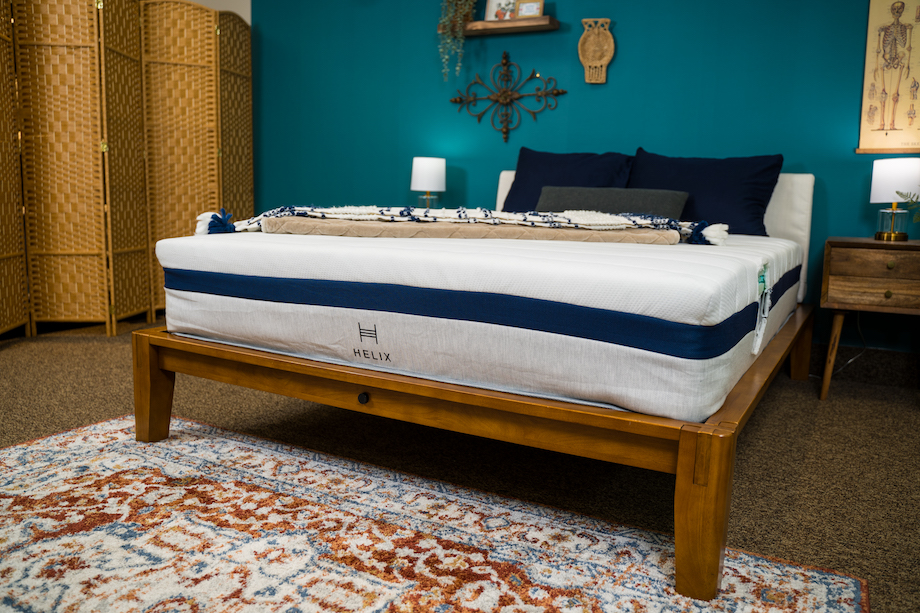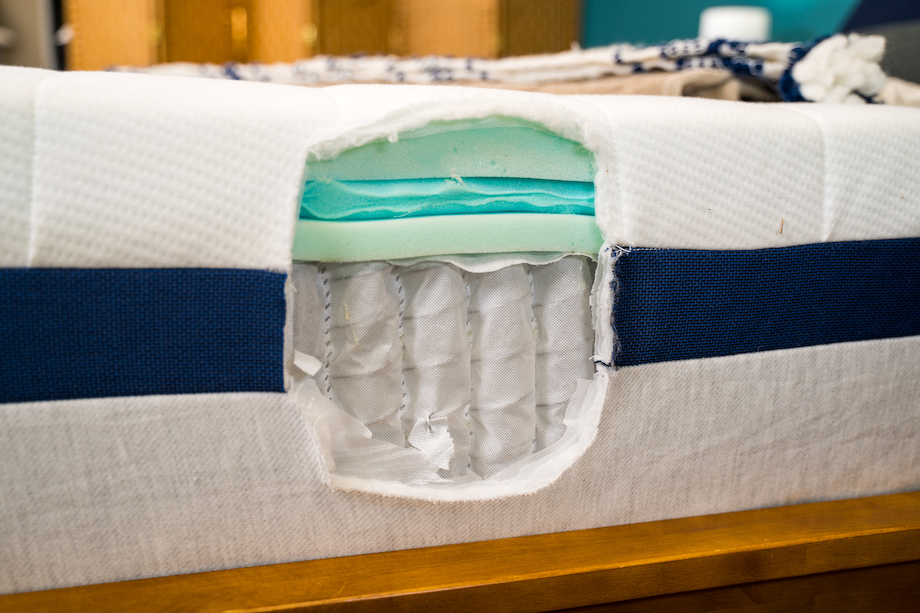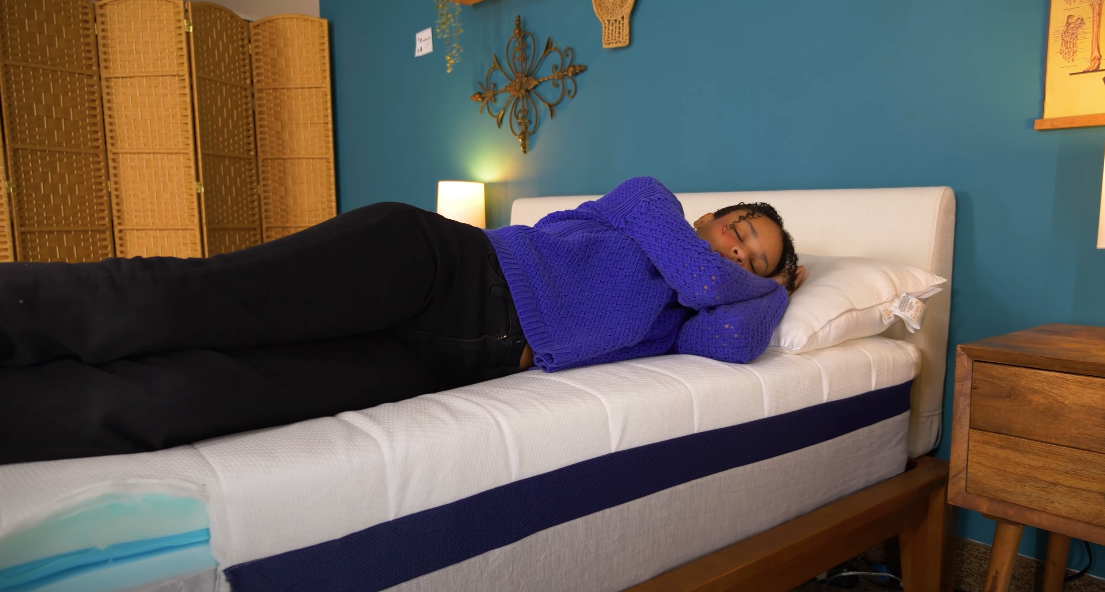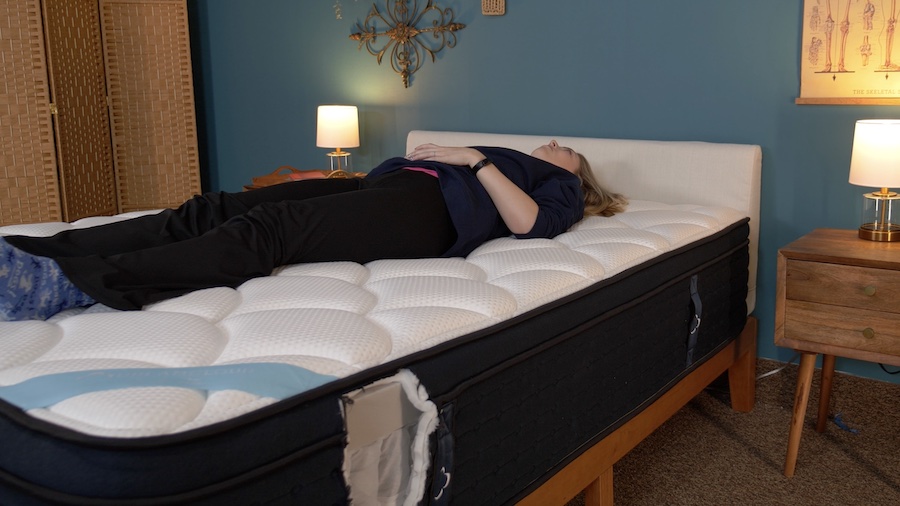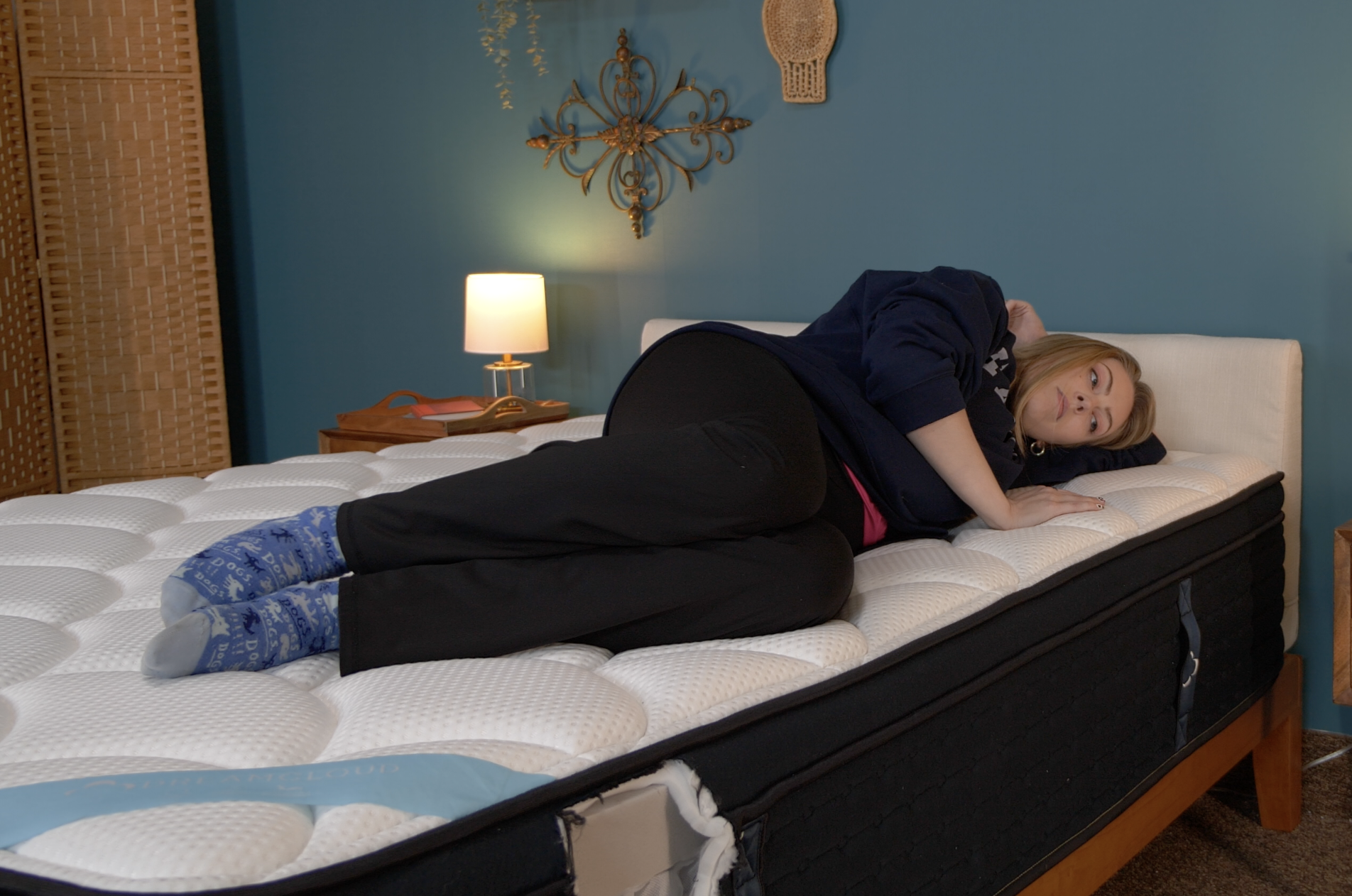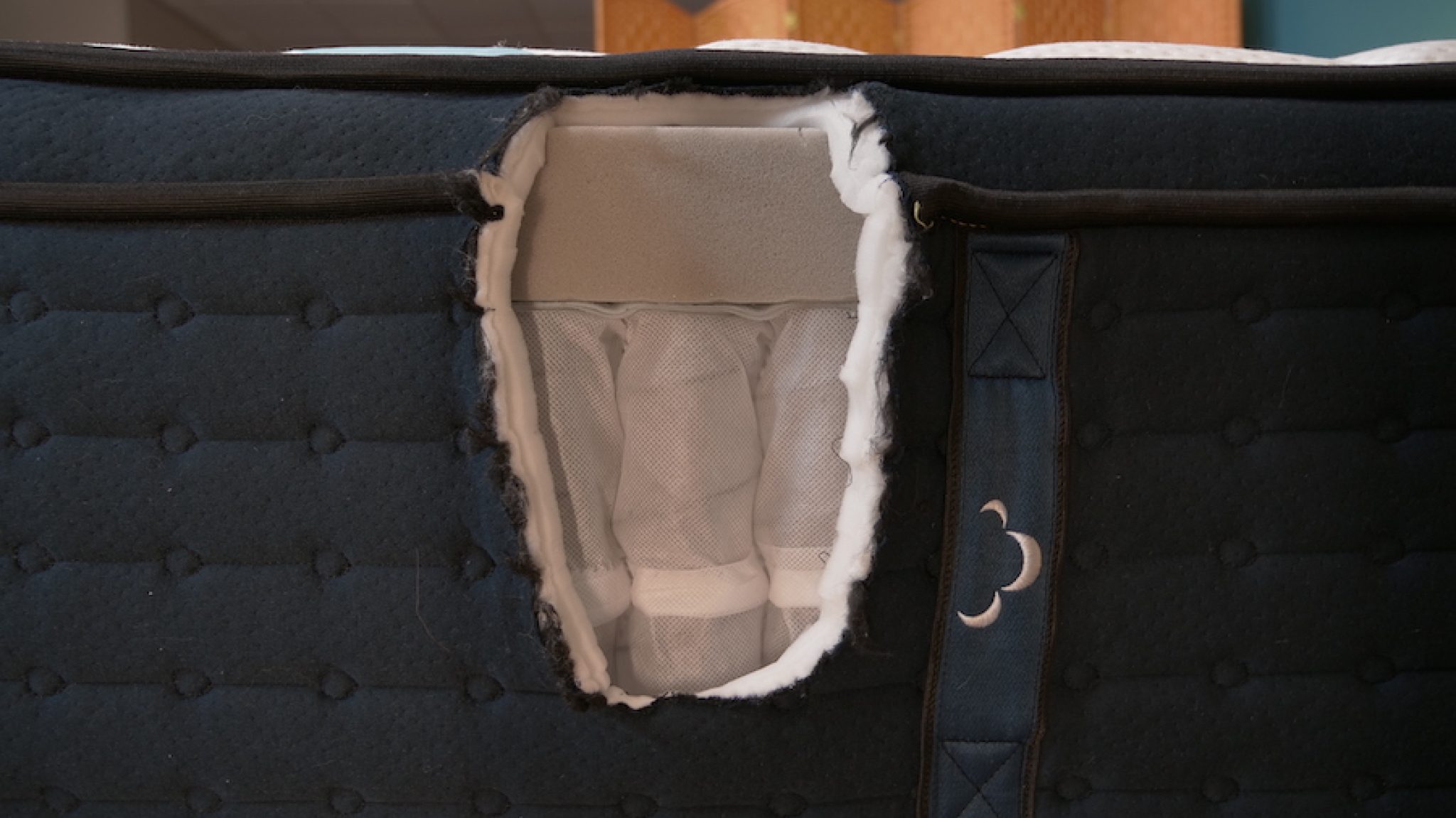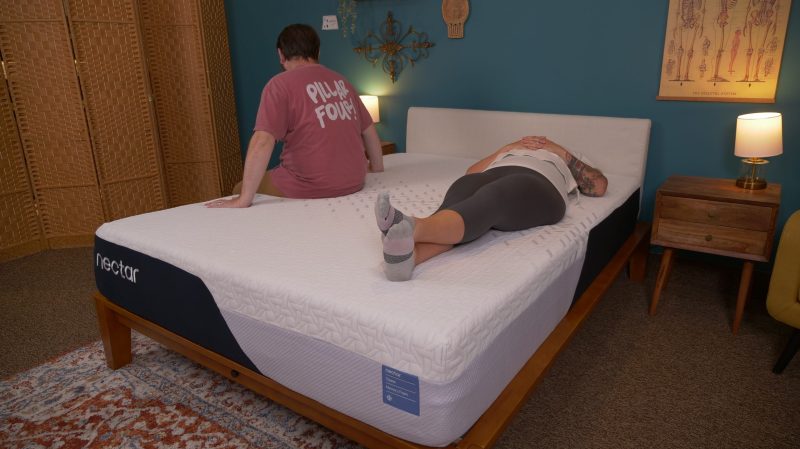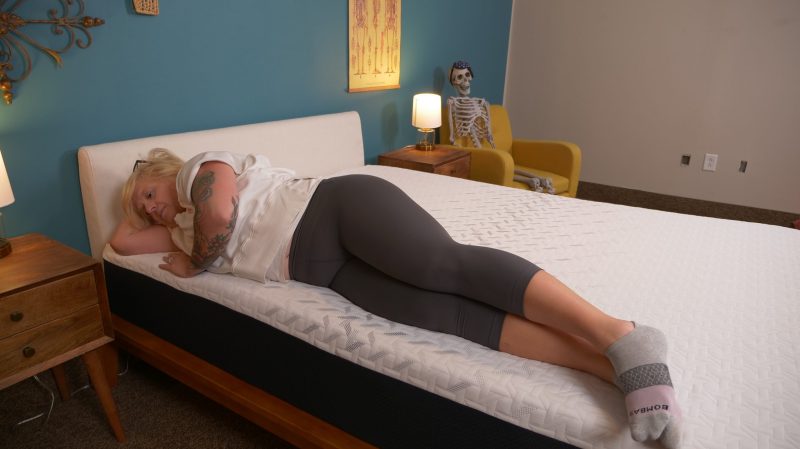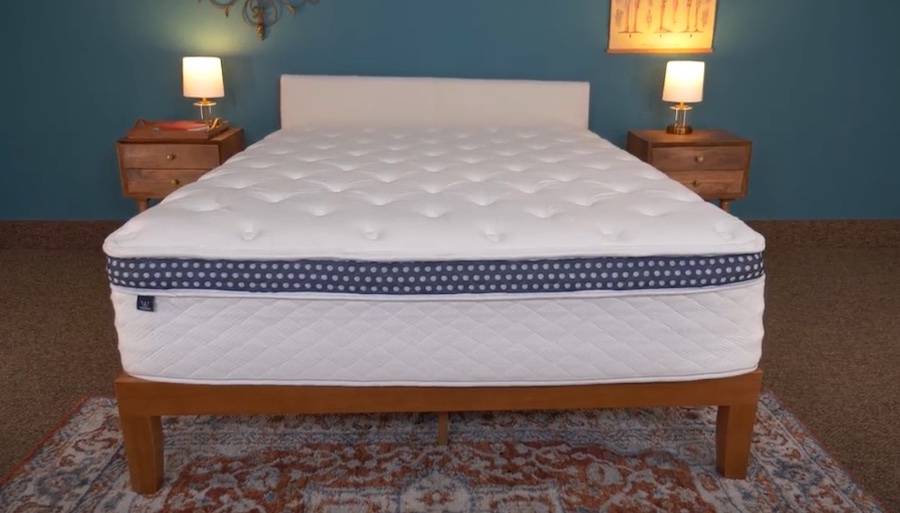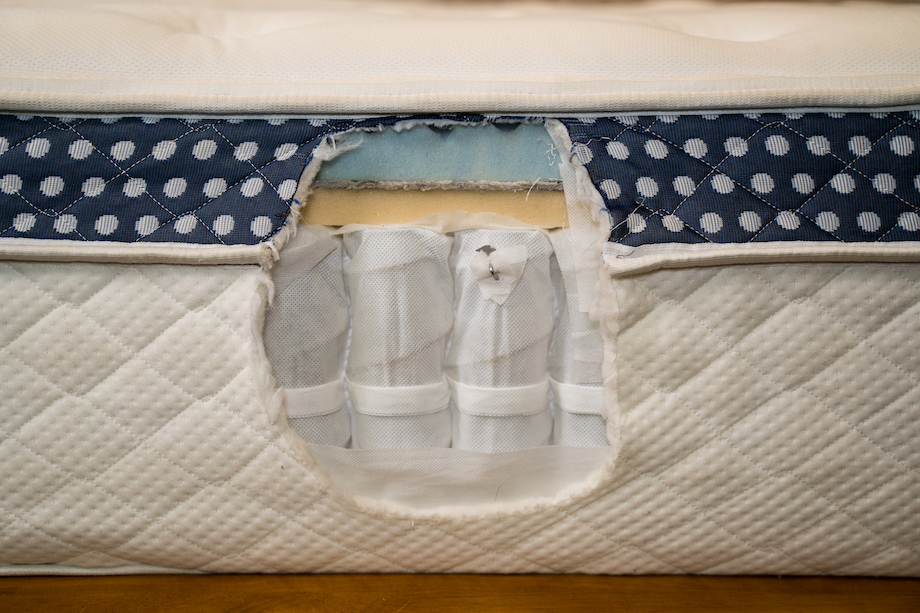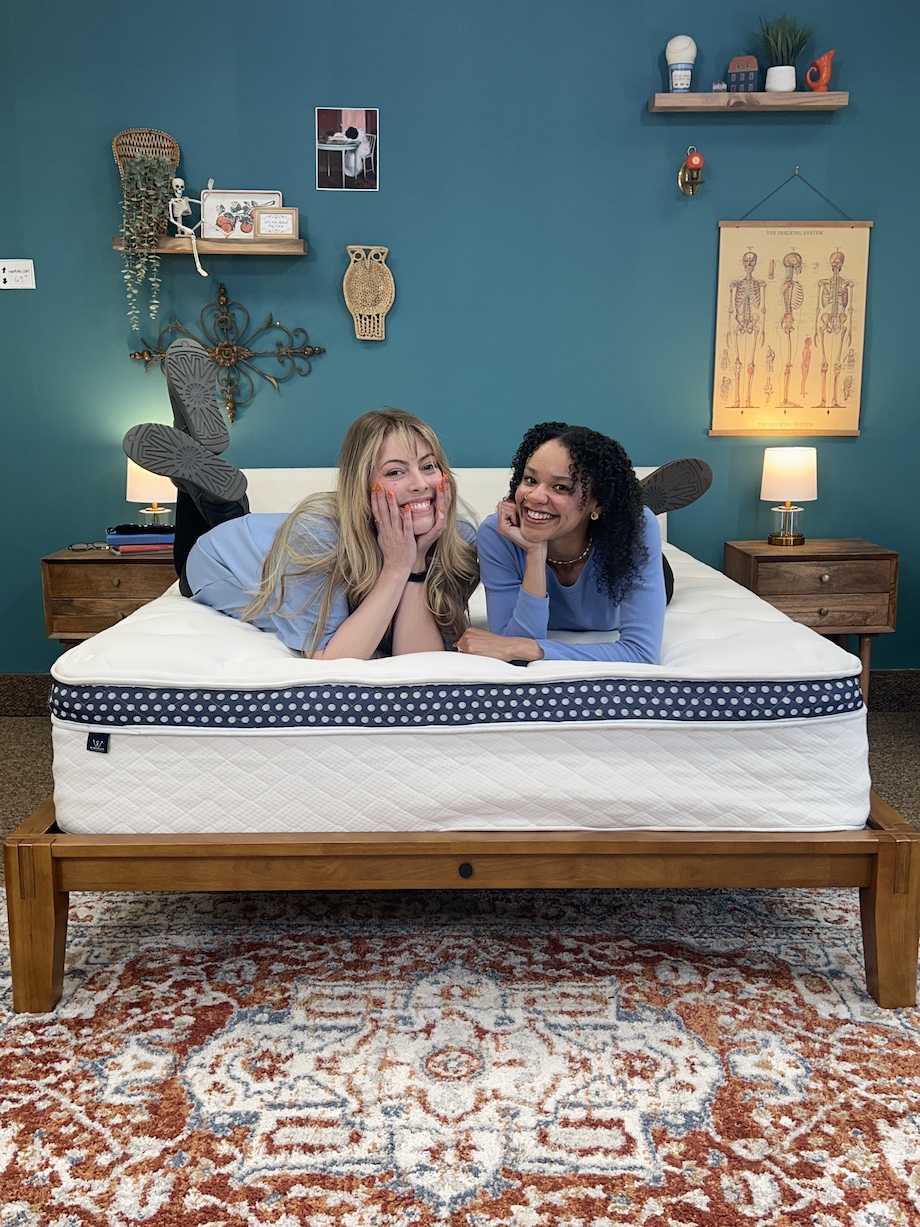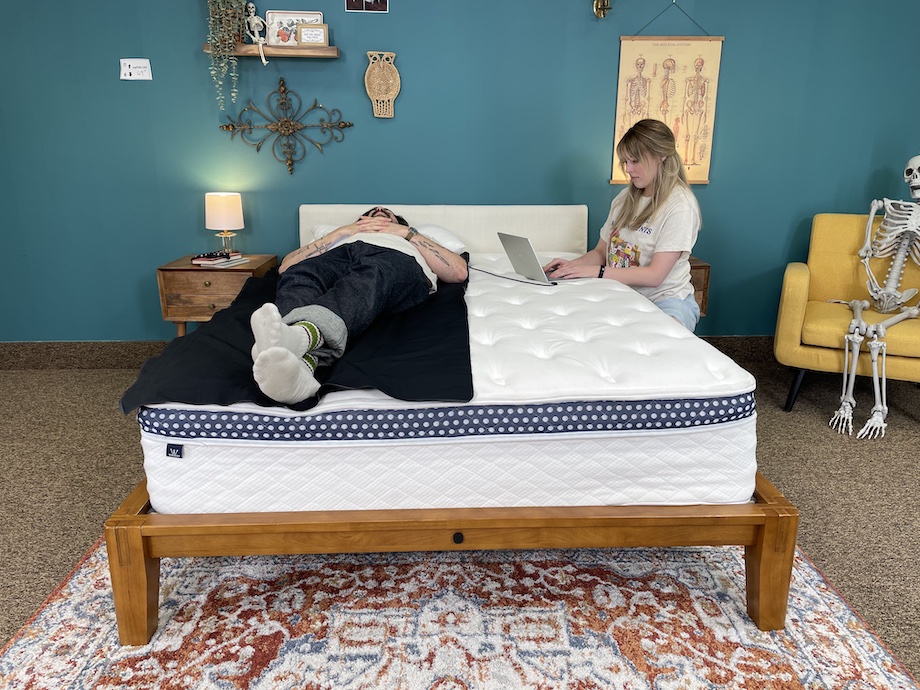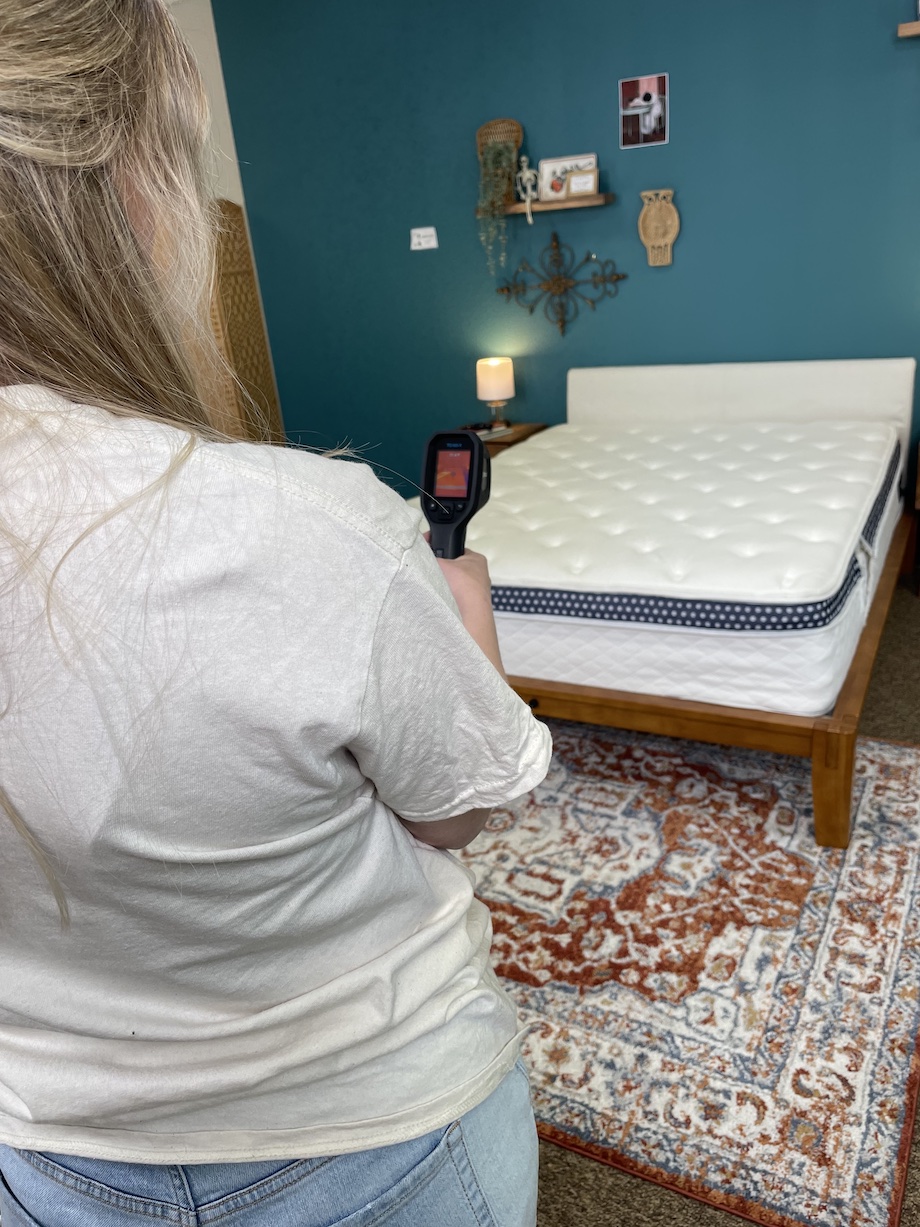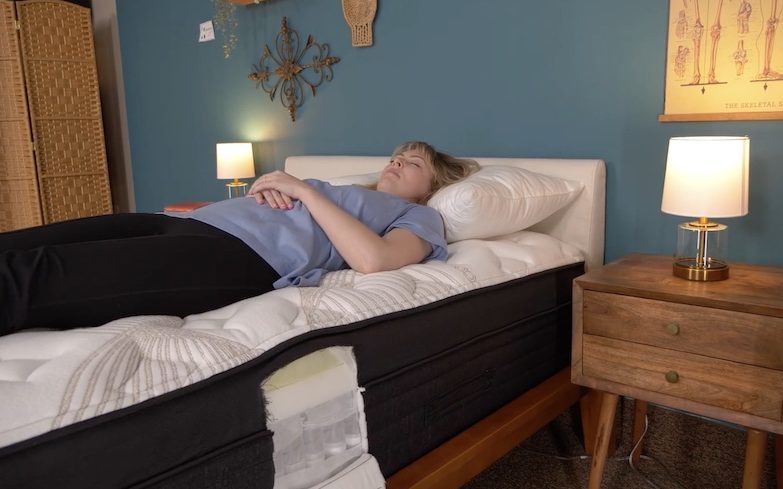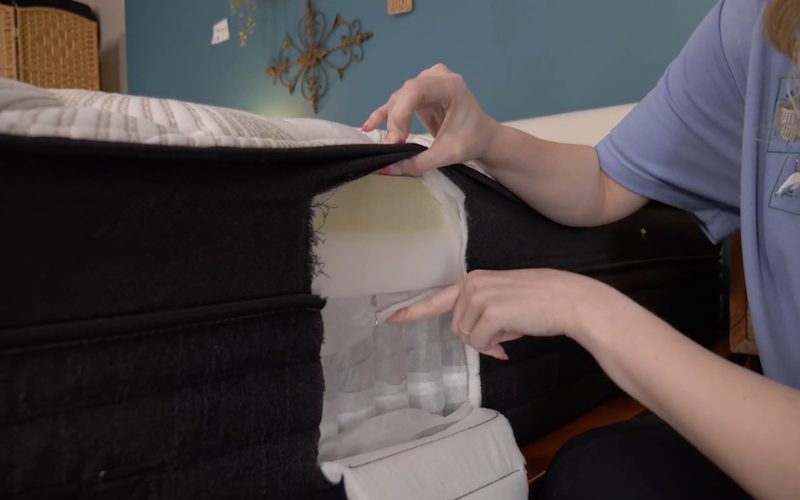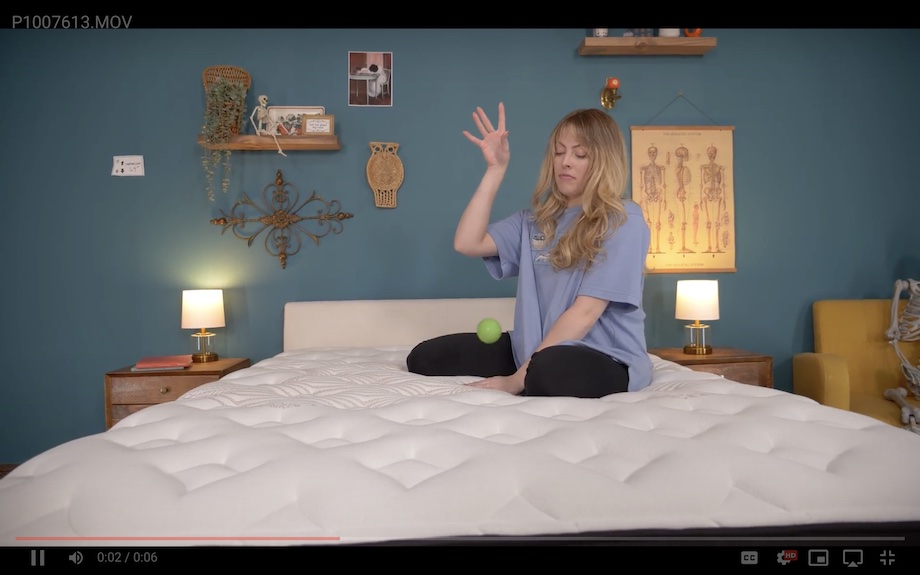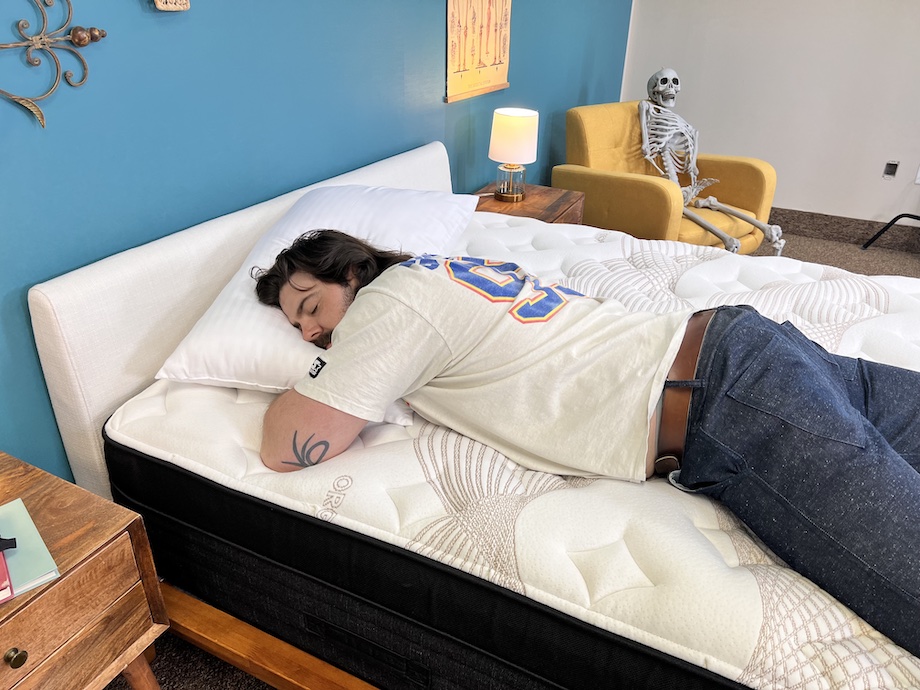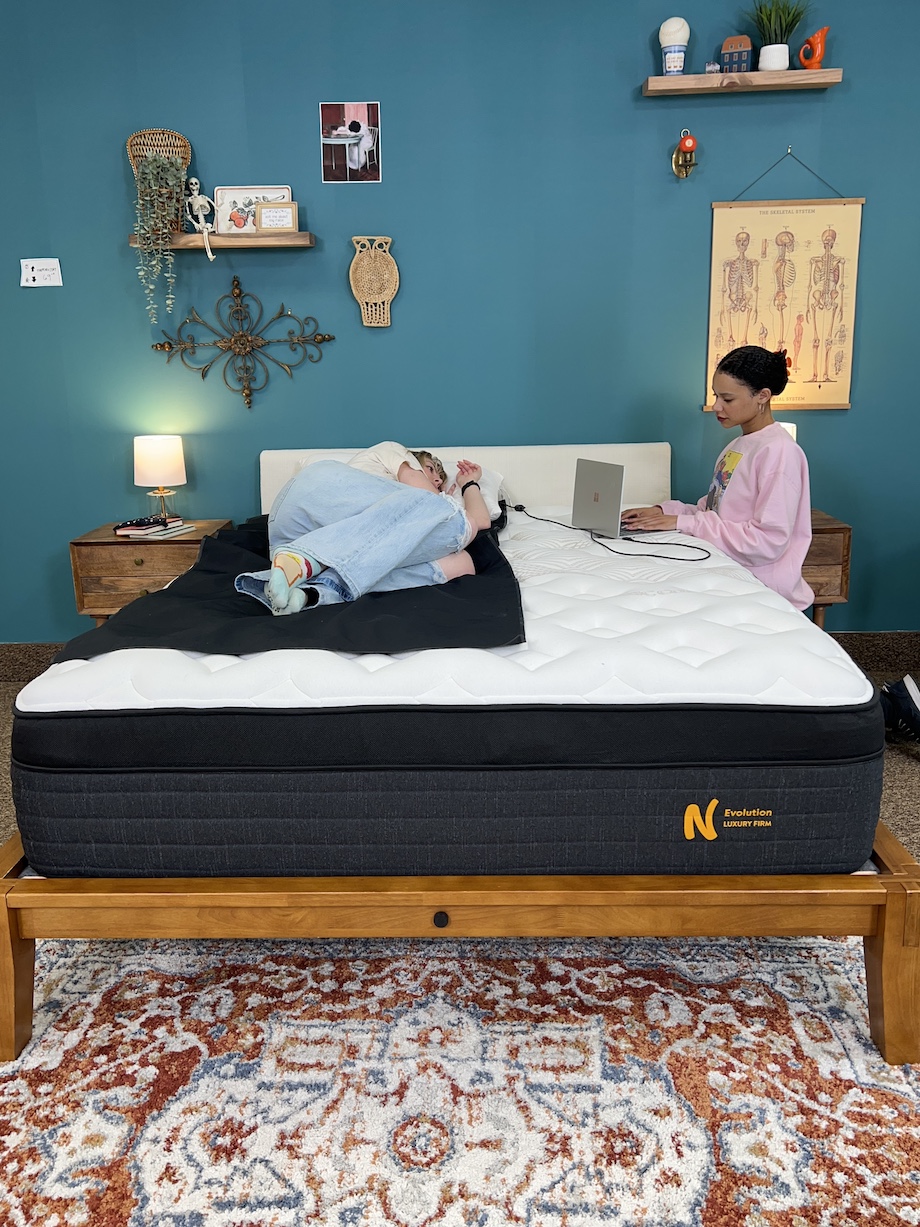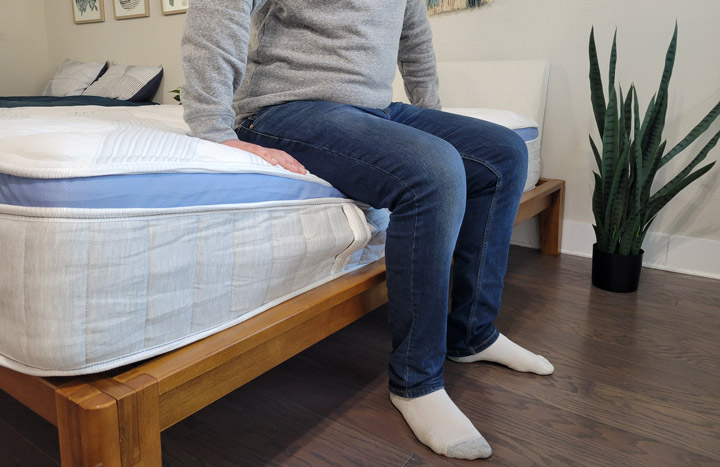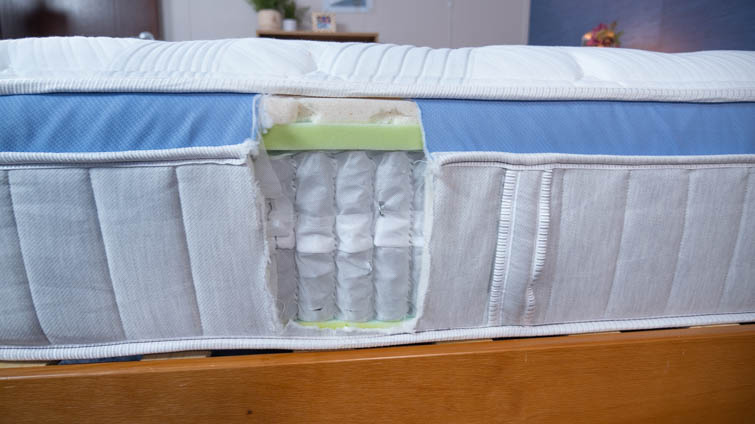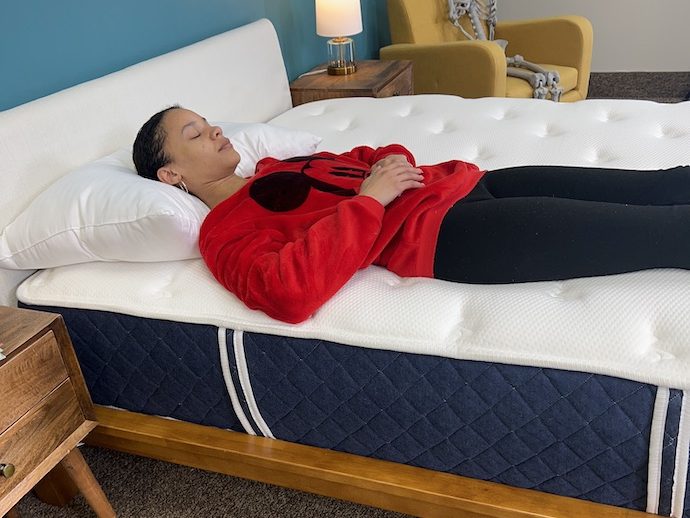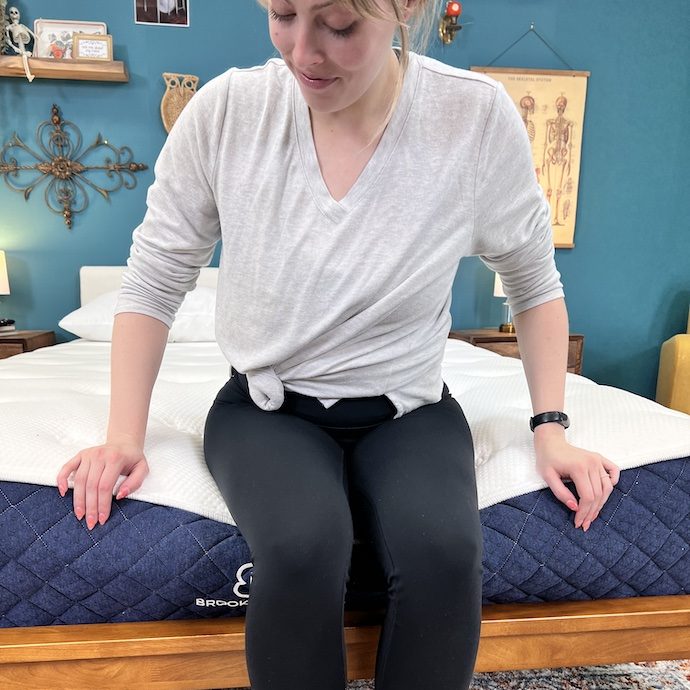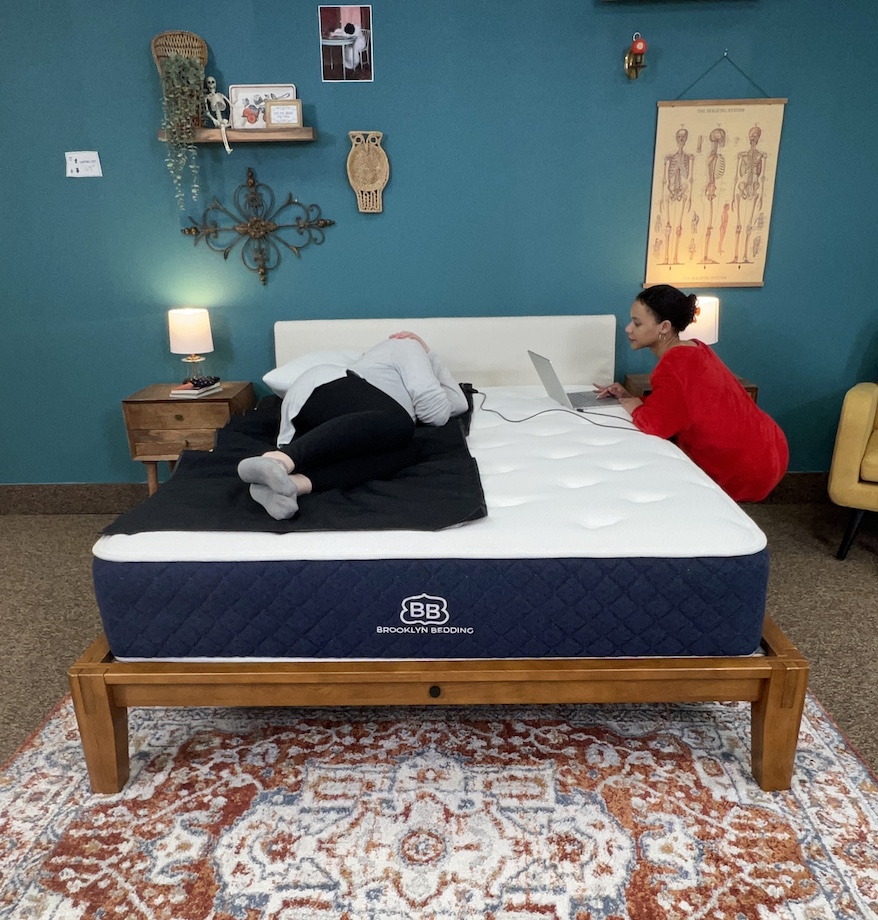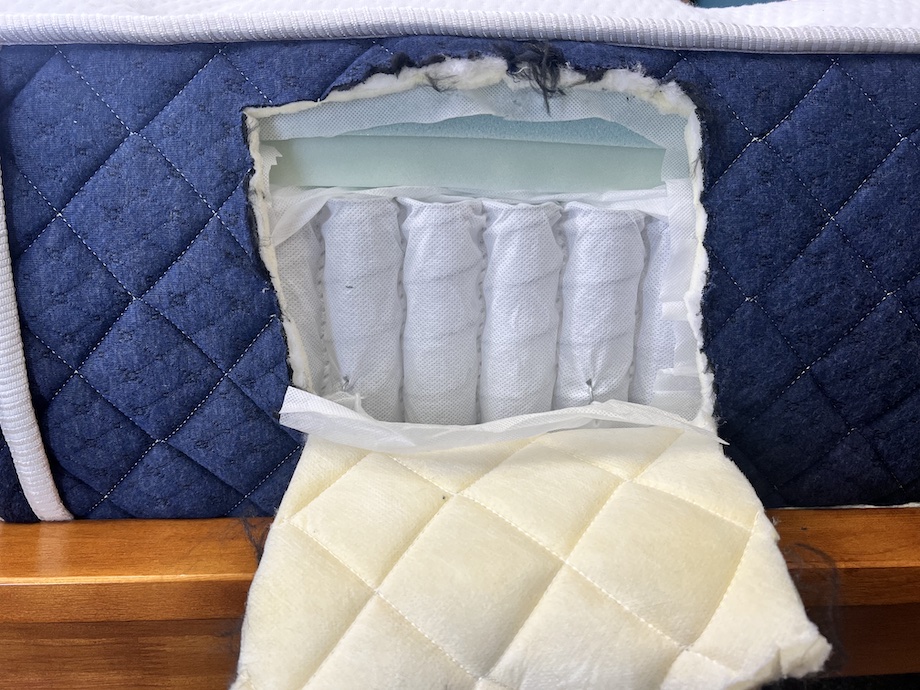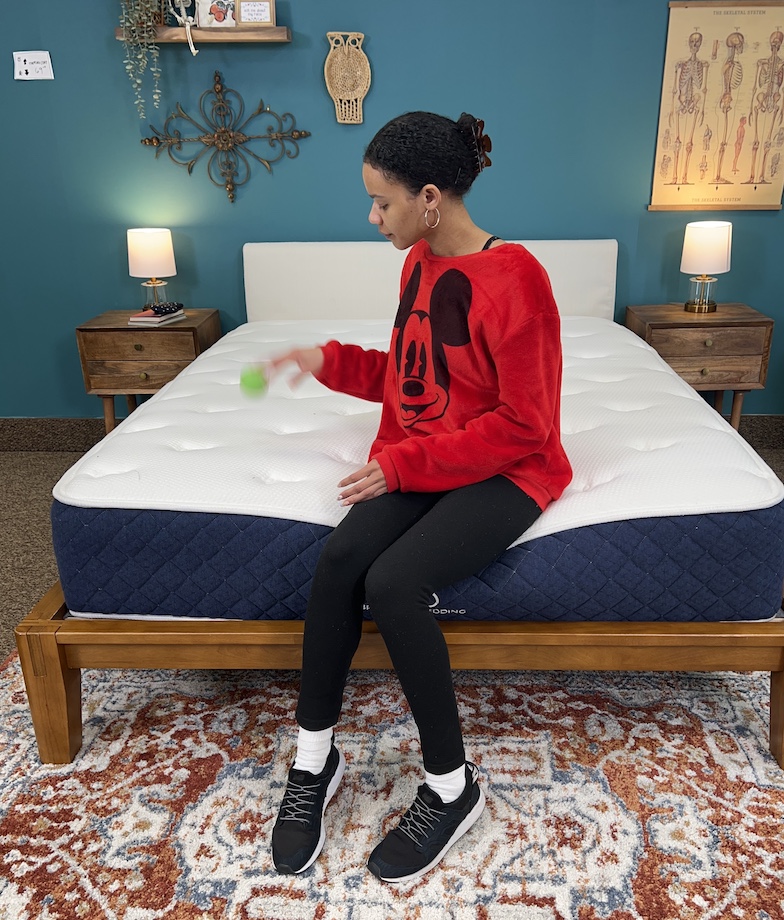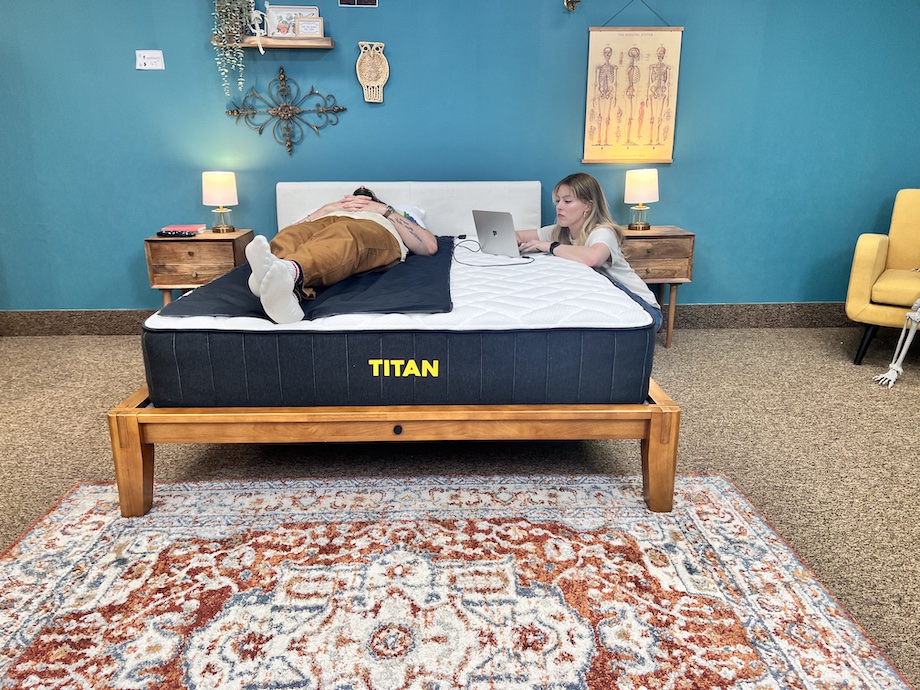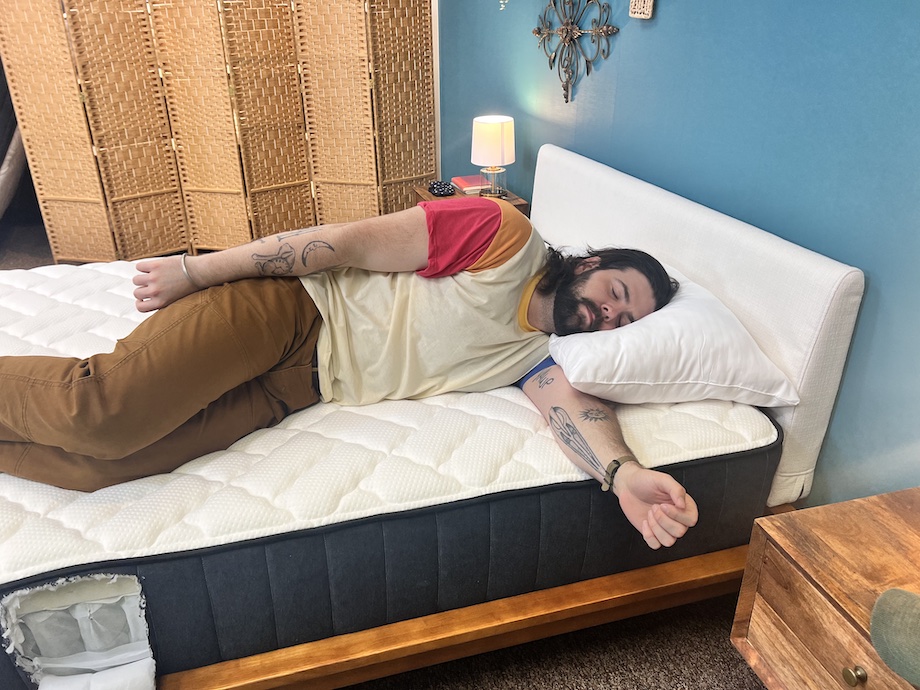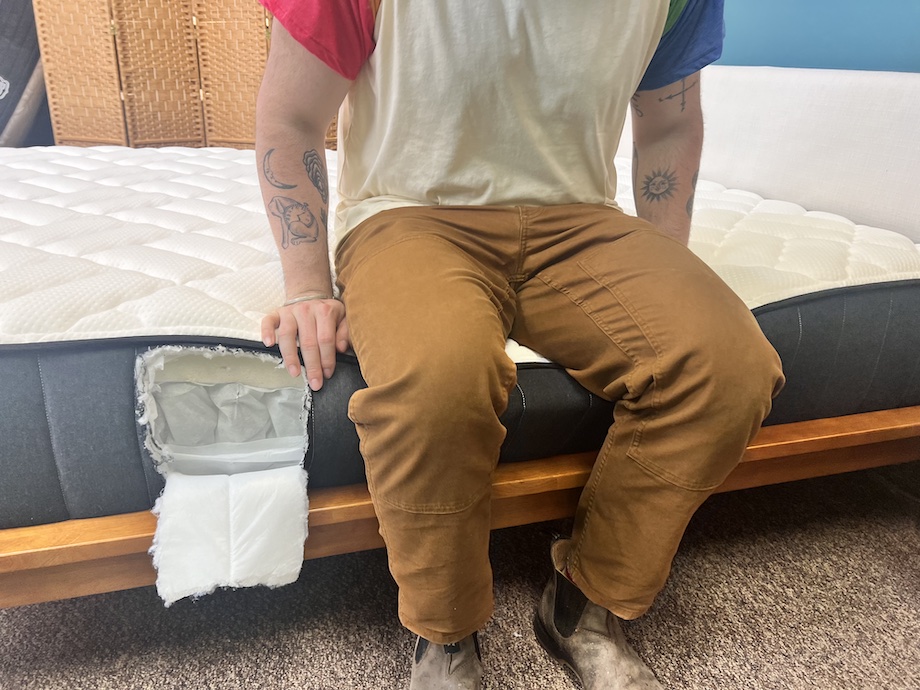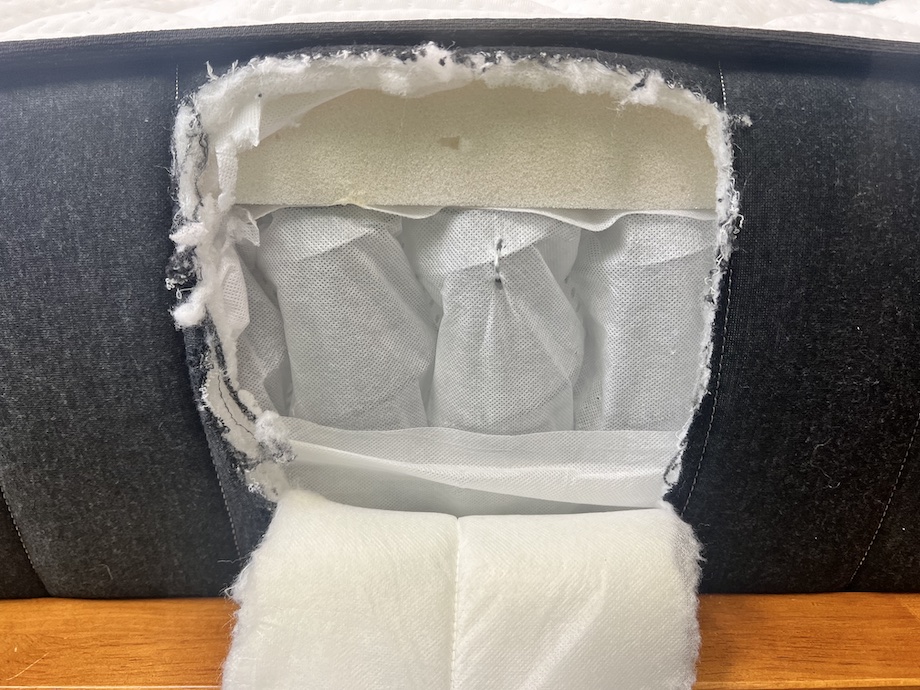There are few issues more maddening than not being able to sleep. While there are several factors that can cause insomnia, a bed not suited for your body type or preferred sleep position may be a factor.
If you’re struggling with insomnia and are unable to function during the day, you should seek professional medical help. However, in addition to talking to your doctor, there are steps you can take that may help you get a better night’s sleep, such as finding the best mattress for insomnia.
We’ve assembled a list of the best beds for those who experience insomnia. In this guide, we break down why each bed may help insomniacs sleep better, including their best features, as well as links to the full review of each mattress.
Best Mattresses for Insomnia
- Helix Midnight – Editor’s Pick
- DreamCloud Premier – Best Mattress for Side Sleepers with Insomnia
- Nectar – Best Cheap Mattress for Insomnia
- WinkBeds Plus – Best Mattress for Heavy People with Insomnia
- Nolah Evolution – Best Mattress for Couples with Insomnia
- Bear Star Hybrid – Best Mattress for Back Sleepers with Insomnia
- Brooklyn Bedding Signature Hybrid – Best Hybrid Mattress for Insomnia
- Titan Plus – Best Firm Mattress for Insomnia
Compare the Best Beds for Insomnia
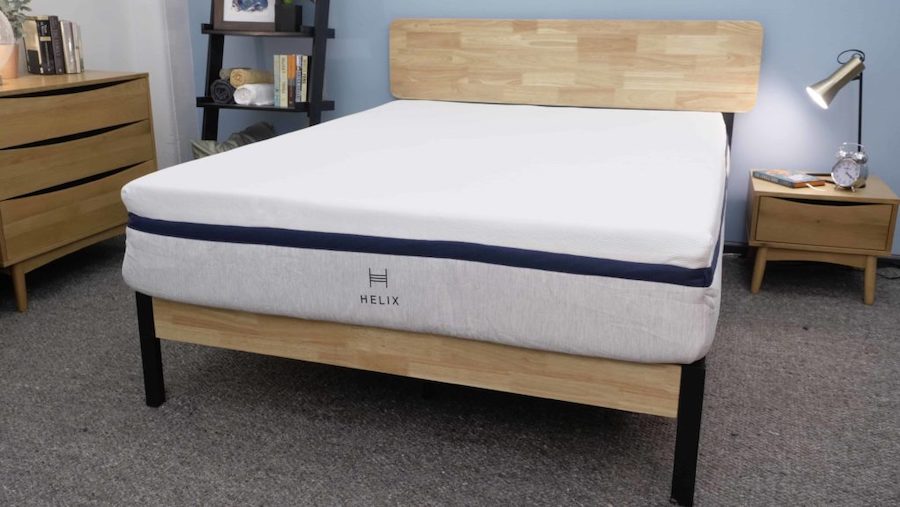
|
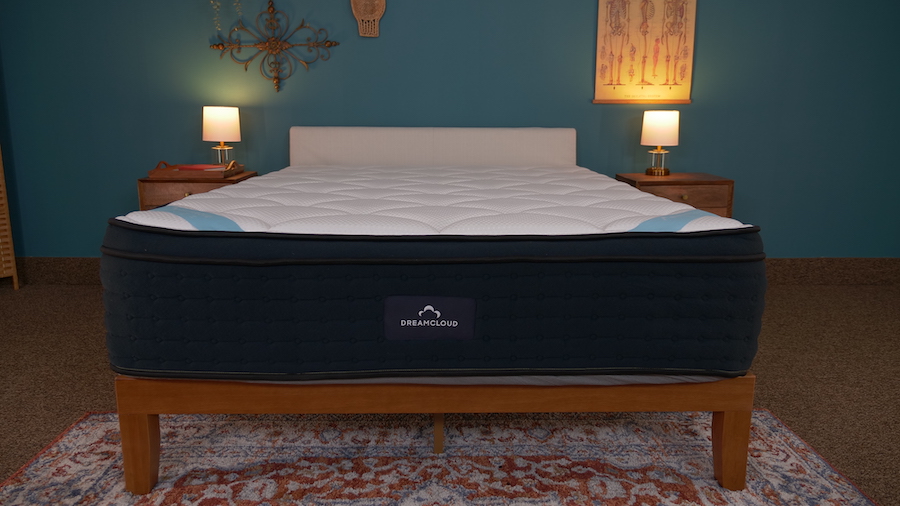
|
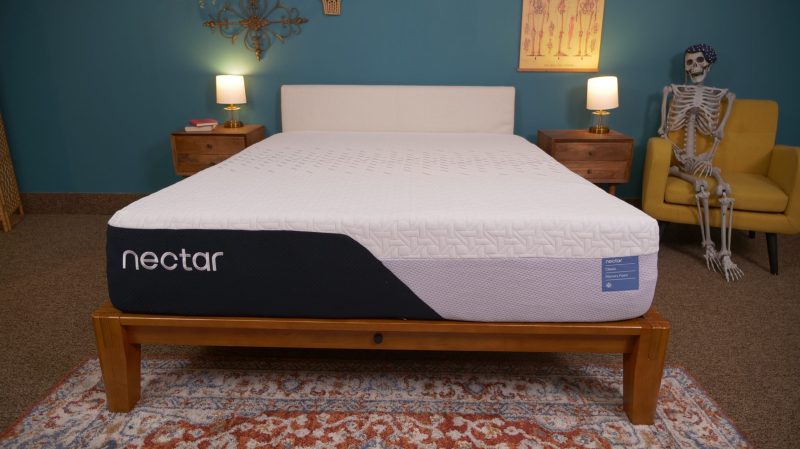
|
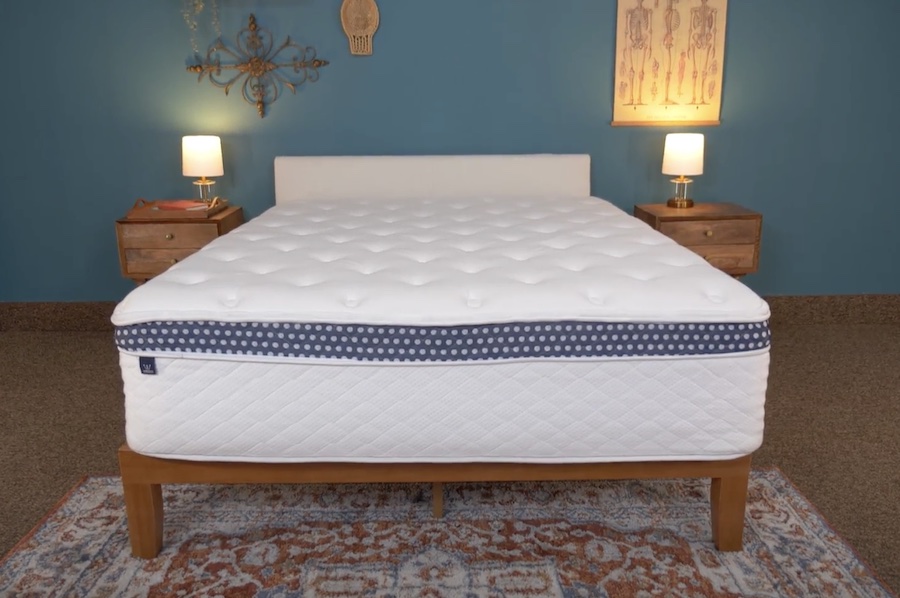
|
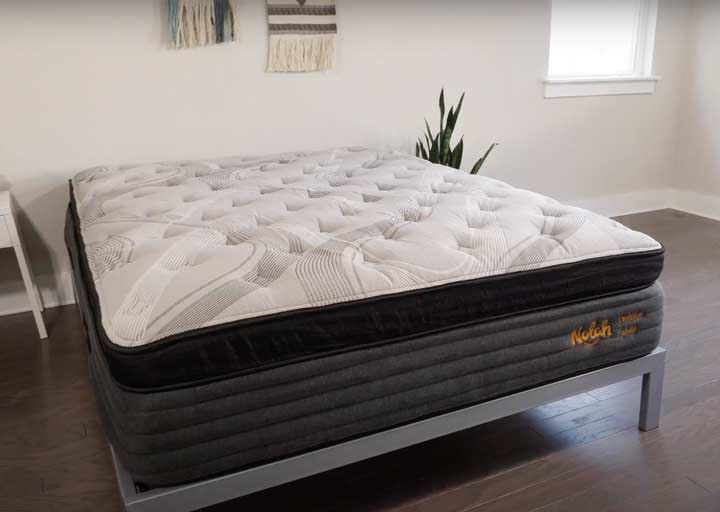
|
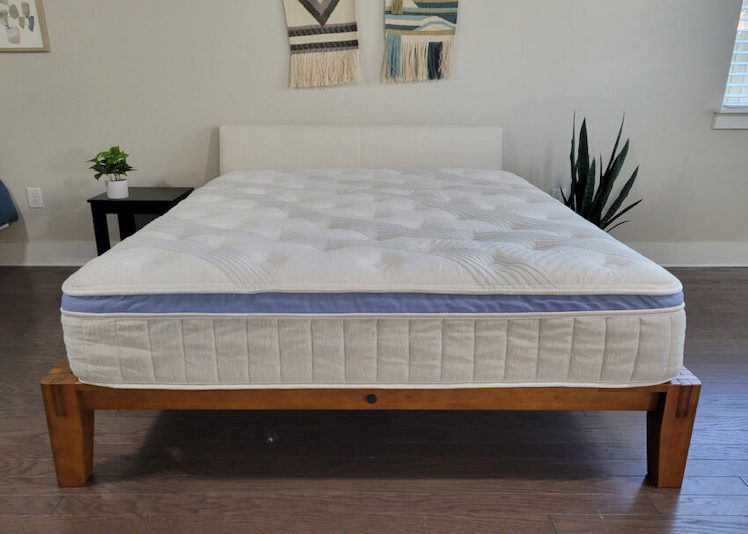
|
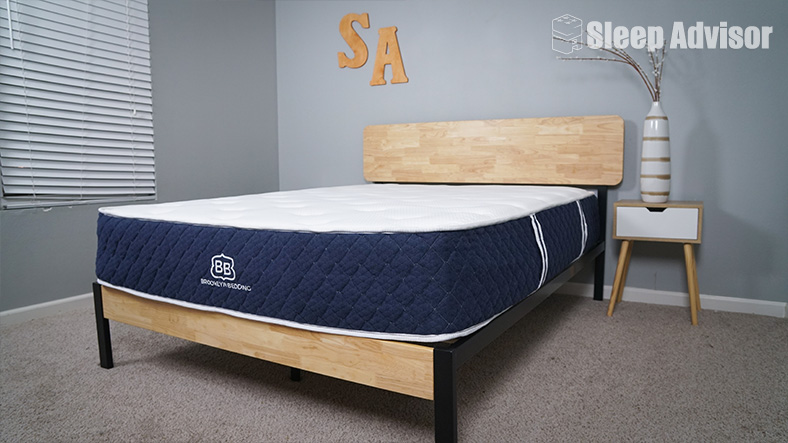
|
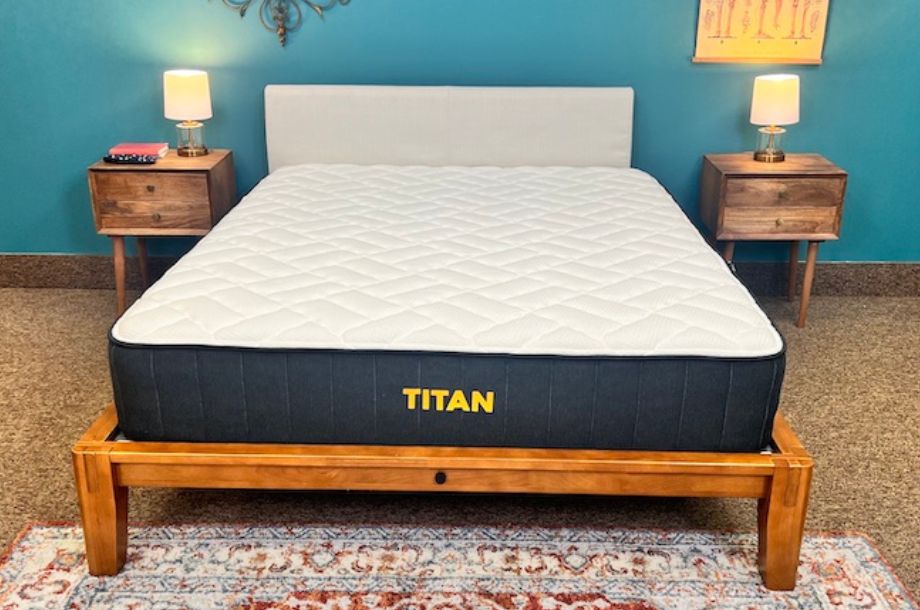
|
|
| Helix Midnight Mattress | DreamCloud Premier Mattress | Nectar Mattress | WinkBed Plus Mattress | Nolah Evolution Hybrid Mattress | Bear Star Hybrid Mattress | Brooklyn Bedding Signature Hybrid Mattress | Titan Plus | |
| Rating | ||||||||
| Firmness | Medium-firm: 6/10 | Medium: 5.5/10 | Firm: 7.5/10 | Medium-firm: 6.5/10 | Multiple firmness options | Medium-firm: 6.5/10 | Multiple firmness options | Firm: 8/10 |
| Material | Hybrid | Hybrid | Foam | Hybrid | Hybrid | Hybrid | Hybrid | Hybrid |
| Cooling | — | — | — | — | — | |||
| Warranty | 10-year warranty | Lifetime warranty | Lifetime warranty | Lifetime warranty | Lifetime warranty | Lifetime warranty | 10-year warranty | 10-year warranty |
| Shipping | Free shipping | Free shipping | Free shipping | Free shipping | Free shipping | Free shipping | Free shipping | Free shipping |
| Trial Period | 100 nights | 365 nights | 365 nights | 120 nights | 120 nights | 120 nights | 120 nights | 120 nights |
| Best For | Couples, Back Sleepers, Side Sleepers | Back Sleepers, Hot Sleepers | Back Sleepers, Back Pain, Stomach Sleepers, Side Sleepers, Couples | Back Sleepers, Stomach Sleepers, Hot Sleepers | Side Sleepers, Back Sleepers, Hip Pain, Seniors | Joint Pain, Side Sleepers, Back Sleepers, Hot Sleepers | Couples, Back Sleepers, Hip Pain | Back Sleepers, Stomach Sleepers, Back Pain, Hip Pain, Seniors |
Sleep Advisor’s Testing Methodology
At Sleep Advisor, our mattress reviews are based on findings from in-person tests that allow us to have a genuine understanding of how the mattress feels and performs. We look at features that are valuable to consumers, such as temperature control, bounce, edge support, and motion isolation.
We then take all the information we’ve gathered to rate the bed in specific categories. These results allow us to help our readers find the right mattress for their needs.
Learn more about our product testing methodology here.
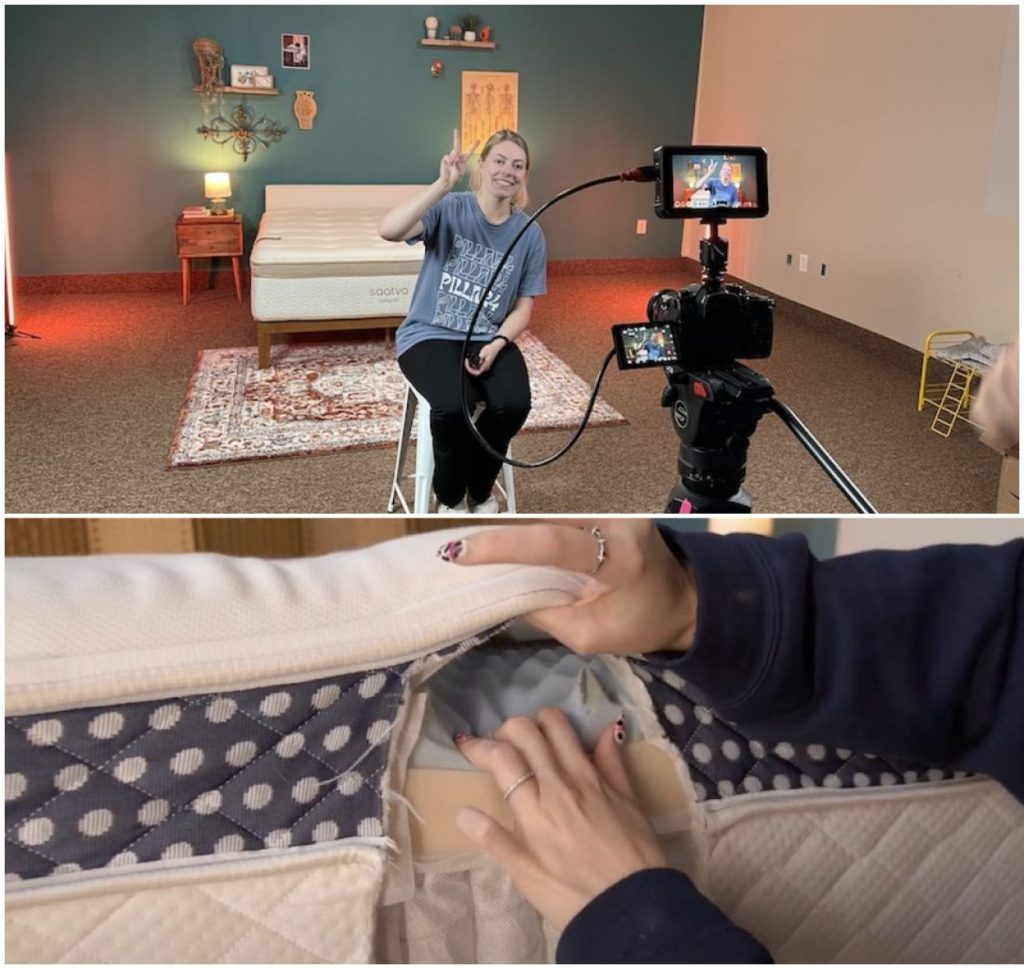
Best Mattresses for Insomnia
Helix Midnight – Editor’s Pick
The Advisor Says: The Midnight has one of the most impressive score spreads of all the mattresses we’ve reviewed. The best word to describe it is “balanced”: it’s got pressure relief, support, and cooling power in spades, plus a versatile medium-firm feel that tends to satisfy lots of sleepers.
Why the Helix Midnight Earned Editor’s Pick
Insomnia often leaves sleepers tossing and turning, constantly readjusting their position. Because of this frequent shifting, you won’t want to feel swallowed by your bed. Enter the Helix Midnight.
The Helix Midnight is a hybrid mattress with responsive foams and coils that should help restless sleepers find peace at night. Adding to this bed’s appeal is its medium-firm rating which should be a good middle-ground feel for most sleep preferences. Therefore, it’s earned our top spot as an all-around solid pick.
DreamCloud Premier – Best Mattress for Side Sleepers with Insomnia
The Advisor Says: Its fancy quilted cover and generous foam layers make the DreamCloud Premier a slightly softer bed than the original DreamCloud. But, it still skews firm for a hybrid, so it’s best for back and side sleepers who like an initial bit of cushion followed by lots of lift.
Why the DreamCloud Premier Earned Best Mattress for Side Sleepers with Insomnia
Side sleeping is the most popular sleep position. However, side sleepers can experience uncomfortable pressure buildup that disrupts their quality of rest. A great mattress for side sleepers, especially those dealing with insomnia, has high-quality materials to help alleviate pressure.
The DreamCloud Premier has very valuable components for side sleepers, such as its luxurious Euro top with two foam layers quilted into it. One of those foam layers is memory foam, easily one of the top materials for pressure relief. I heartily recommend this bed for side sleepers everywhere, as it felt supremely pillowy during testing.
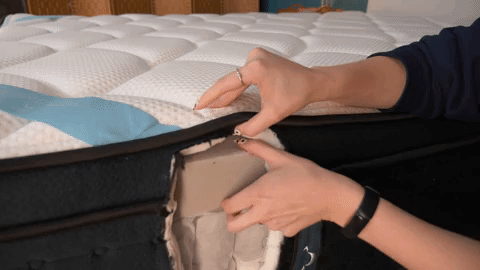
Nectar – Best Cheap Mattress for Insomnia
The Advisor Says: We believe that Nectar offers a quality bed backed up by generous policies, and for under $1,000 for a queen (after discounts). If you’re looking for a firmer foam mattress on a budget, the Nectar Classic has you covered.
Why the Nectar Earned Best Cheap Mattress for Insomnia
Sore pressure points at the root of your restlessness? On a tight budget? Nectar’s deeper hug and approachable price may bring relief.
This bed’s low cost makes a high-quality memory-foam experience more attainable, and doesn’t dovetail with a drop in quality. Nectar keeps prices down by reducing overhead costs that add up for beds in retail stores, and by committing to a simple but extremely effective three-layer design.
WinkBeds Plus – Best Mattress for Heavy People with Insomnia
The Advisor Says: Our testers often compare the WinkBed to a luxury hotel mattress, which is no surprise given its handcrafted touches and elegant hybrid design. It’s also one of the most customizable beds out there, with a firmness level for every body type.
Why the WinkBed Plus Earned Best Mattress for Heavy People with Insomnia
Heavier people are more likely to have certain conditions that could disrupt a healthy sleep cycle, and it may be difficult to find a bed that can offer the unique blend of pressure relief and additional support that a larger frame requires.
Beds designed for people in a lighter weight range often aren’t built to accommodate plus-sized folks. But the WinkBed Plus has been specifically tested to maintain its durability and support sleepers who weigh more than 250 pounds, so they can enjoy the sustained comfort that comes with a bed built to last.
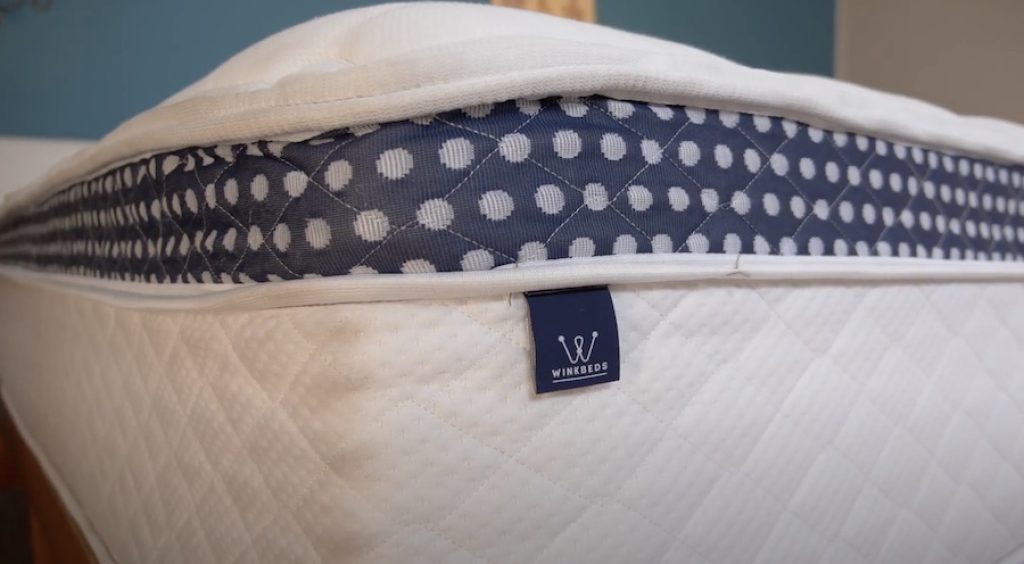
Nolah Evolution – Best Mattress for Couples with Insomnia
The Advisor Says: The Nolah Evolution is a team favorite with a highly competitive score spread—our testers gave it at least a 4 out of 5 in every single performance category. It’s definitely a luxury mattress, with the height (and price) to match.
Why the Nolah Evolution Earned Best Mattress for Couples with Insomnia
If one member of a couple has insomnia, it can also affect the other’s sleep. Therefore, it’s vital to find a bed that can meet both people’s needs for uninterrupted rest.
Thankfully, the Nolah Evolution is equipped with many features that could prove useful for couples dealing with insomnia, including cooling foams, dynamite edge support, and zoned coils. It also comes in three firmness levels, allowing couples to select a customized feel. For example, if both partners are stomach sleepers, they’re more likely to feel more comfortable on the Evolution Firm as opposed to the Plush.
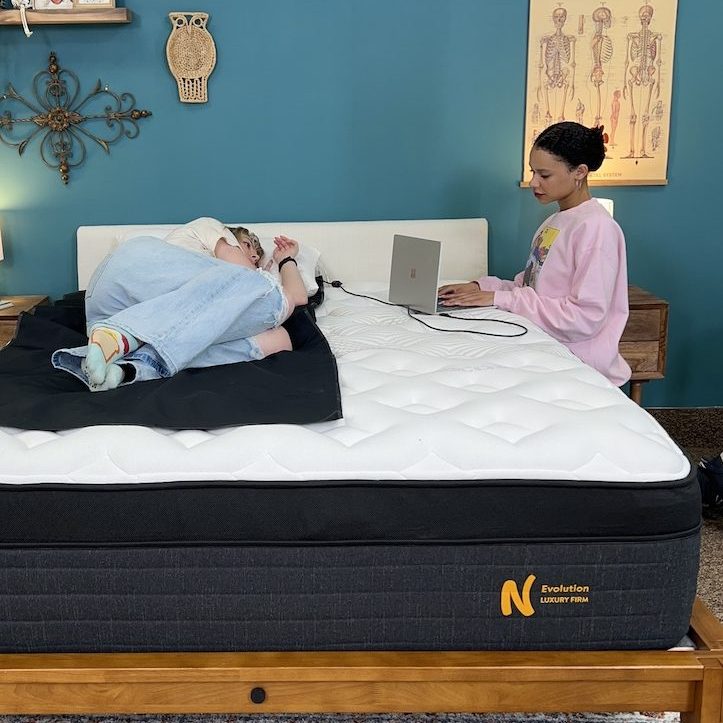
Bear Star Hybrid – Best Mattress for Back Sleepers with Insomnia
The Advisor Says: The Bear Star Hybrid touts an enviable medium-firm feel that should appeal to a swath of mattress shoppers, including couples with different preferences looking to “compromise.” We gave this hybrid perfect scores in pressure relief, support, and motion transfer.
Why the Bear Star Hybrid Earned Best Mattress for Back Sleepers with Insomnia
The Bear Star Hybrid was designed with active folks in mind, but it’s actually a rather versatile bed when it comes to the features it offers and the positions it can accommodate.
Back sleepers especially should enjoy the Bear Star Hybrid’s medium-firm feel, which balances pressure relief and firm support. And if overheating is the cause of your insomnia, have no fear, because the Star Hybrid is outfitted with plenty of cooling technology to prevent sweating.
Brooklyn Bedding Signature Hybrid – Best Hybrid Mattress for Insomnia
The Advisor Says: For shoppers on a budget, the Brooklyn Bedding Signature Hybrid is one of the top hybrids we recommend. It’s simultaneously soft and bouncy, with three firmness options and decent cooling power.
Why the Brooklyn Bedding Signature Hybrid Earned Best Hybrid Mattress for Insomnia
For its price, the Brooklyn Bedding Signature Hybrid almost seems too good to be true. As our tester Emma put it: “If you’re looking for an affordable and durable mattress, you might just love this bed.”
Restless sleepers should appreciate the springiness of its hybrid construction, which makes switching positions easy as they try to get comfortable. Combine this with a bolstering support that leaves you feeling “lifted” on the surface, and you’ve got a supportive, bouncy bed.
Titan Plus – Best Firm Mattress for Insomnia
The Advisor Says: Brooklyn Bedding created the Titan Plus to cater to heavier shoppers looking for a bed that truly met their needs, and we believe they’ve delivered. Consider buying the Titan Plus if you’re looking for a comfortably supportive mattress with added benefits like cooling and bounce.
Why the Titan Plus Earned Best Firm Mattress for Insomnia
As the name implies, the Titan Plus is marketed toward heavier folks who can’t get the proper amount of support from other mattresses. This means that the surface of the Titan Plus is Firm with a capital F to ensure plus-sized bodies stay elevated on the mattress.
For restless sleepers, the Titan Plus balances responsiveness with motion isolation, thanks to its hybrid construction and foam top layers. You should be able to reposition to your heart’s content—all while leaving your sleeping partner undisturbed.
What to Look for in a Mattress for Insomnia
Insomnia, a disorder that can make it hard to fall or stay asleep, can be frustrating, and it can affect all aspects of your life. Although your mattress may not be able to cure insomnia, knowing what to look for in one may help remedy some of your symptoms. Therefore, your sleep characteristics and preferences can help you choose a bed that may be able to offset some of the issues associated with insomnia.
Advice from a Medical Expert
We reached out to Dr. Raj Dasgupta, who has over 20 years of experience in the medical field, to see his thoughts on what key qualities people with insomnia should look for in a mattress.
“When choosing a mattress to help with insomnia, focus on comfort and support to help you relax and sleep better. Look for features like pressure relief, motion isolation, temperature regulation, and durability to make sure you’re setting yourself up for a good night’s sleep.”
Comfort and Support
When sleep is hard to come by, you will want a comfortable and supportive mattress. Although you may think that a bed that feels like an oversized cotton ball is the ultimate luxury, this isn’t always the best option. To enhance your chances of getting quality rest, your mattress should be able to give you enough cushioning for your pressure points while maintaining overall body support to keep your spine in a healthy and neutral alignment.
Hybrids, memory foam beds, and latex mattresses are often great at combining comfort and support. Innerspring models, while supportive, lack the foam layering that typically gives sleepers more comfort.
Noise Reduction
Deep sleepers may be able to sleep through a squeaky frame or a crinkly mattress, but for those with insomnia, a noisy bed can exacerbate their nocturnal issues. To decrease the noise from your bed, you should get a sturdy, solid frame. Other features to look for when shopping for a quiet frame are hearty, evenly-spaced slats set down below the rails, as this can help keep your mattress in place.
Padded headboards and felt that run along the rails can also help prevent noise. Although most mattresses don’t make much noise, some hybrids may make a styrofoam or plastic sound when you move about on them, and the coils in innerspring units can get squeaky, especially over time.
Explore: Best Bed Frames
Trial Period/Warranty
One of my favorite policies when it comes to ordering a bed online is the trial period that most mattress manufacturers offer. Sleep trials allow sleepers to get a solid sense of how the mattress works for them because they can sleep on it for a long period of time to make sure that it is the best fit for them. If you are prone to bouts of insomnia, multi-week sleep trials will allow you to see if the mattress you have chosen helps your insomnia symptoms.
The time period and what is covered vary from mattress to mattress. However, bed-in-a-box warranties typically last from 10 years to a lifetime. These can help ease worries about the money that you’re spending on a mattress.
Durability
A quality mattress that meets your needs can be an important tool if you have insomnia. Therefore, finding a bed that will support you for a long period of time should be a consideration. Durable mattresses will be around for a long haul. Longevity can help offset the cost and ensure that you’ll sleep on a comfortable and supportive mattress for years.
Durable mattresses can be found in innerspring, latex, hybrid, and all-foam, but keep in mind that memory foam is generally more durable than poly foam, but memory foam isn’t as likely to last as long latex. If you’re interested in a hybrid or innerspring mattress, keep in mind that steel coils usually last longer than pocketed or individually wrapped ones.
Discover: Best Mattress That Won’t Sag
Budget
A mattress that meets your personal needs and suits your budget is an important aspect when buying a new bed. Given that financial stress can certainly be a contributor to insomnia, sticking to a pre-set spending amount may help lessen your worries and lead to better sleep. However, a lower price range doesn’t mean you have to settle for a lower-quality bed. High-quality mattresses can be found to fit a variety of budgets.
Learn more: Best Budget Mattresses
Type of Mattress
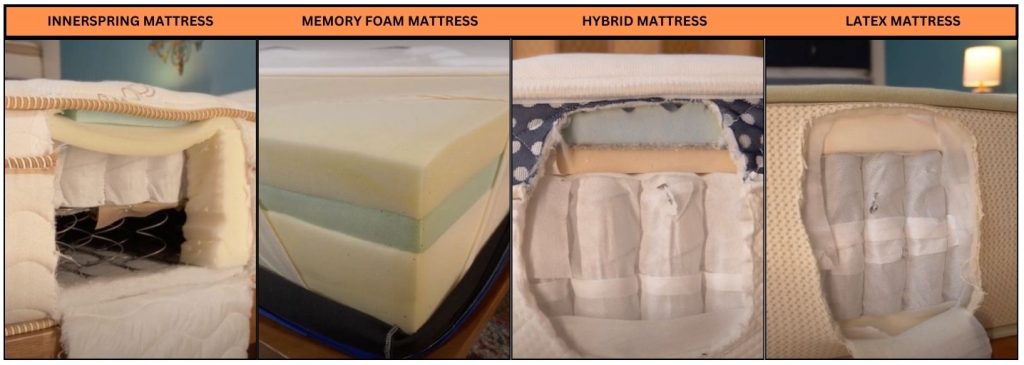
Innerspring Mattresses
Innerspring mattresses, made from coils and a thin comfort layer, are considered a traditional type of bed. Although newer mattress types may be innovative and convenient, there is still a lot to be said about innerspring mattresses for better sleep.
The coils allow for regular airflow, which means they can be a great choice for hot sleepers, and keeping your body temperature regulated can help you stay asleep. Additionally, these mattresses typically have strong edge support. Therefore, if you sleep close to the edge of your bed, you aren’t likely to be startled awake because you feel like you’re falling off. These beds are one of the least expensive options too, which can be great if financial stress is keeping you up at night.
Hybrid Mattresses
Hybrid mattresses are built with both innerspring coils and foam. The foam can be memory foam, latex, or other types of foam. The coils used in these mattresses provide them with good airflow and ventilation, which makes them helpful for those who experience restless nights because they get too hot.
Hybrids are also a solid choice for those who change positions through the night because of their quick response times. This means that those who are combination sleepers won’t likely have to worry as much about waking because it takes too long to get comfortable again.
Memory Foam Mattresses
Memory foam mattresses can be a good fit for those with insomnia because they can counteract many of the issues that cause sleep deprivation. These soft and contouring beds help support your spine and cushion your joints. This may help ease pain from diseases such as fibromyalgia and arthritis.
Co-sleepers who have trouble sleeping due to their partner’s tossing and turning will likely appreciate the motion-isolating properties of memory foam. Given that the symptoms of allergies are a possible cause of insomnia, the hypoallergenic nature of memory foam can help ease the symptoms of allergies, which may allow for easier and better rest.
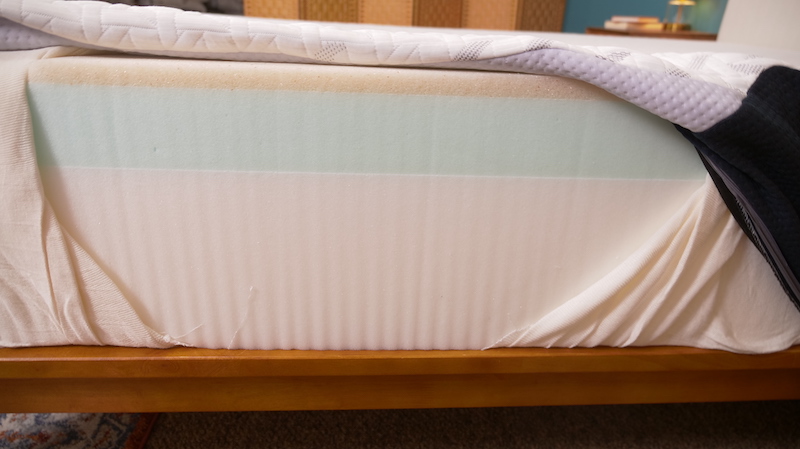
Latex Mattresses
Body temperature is a huge component of getting a good night’s sleep. Those who sleep hot may have a hard time staying asleep. If this is a cause of your insomnia, latex mattresses are a great choice to help keep you cool through the night.
These types of beds could also be a good choice for those who sleep better on a mattress that offers more support and a responsive feel. Also, most latex beds are hypoallergenic and eco-friendly.
How We Test the Best Mattress for Insomnia
Sleeping Position
- When we test beds for back sleepers, we pay special attention to spinal support, how well are hips are elevated, and if the mattress provides pressure relief around our shoulders and lower back.
- Side sleepers place a lot of weight on smaller body areas — the hips and shoulders. To help stave off pressure buildup, side sleeper mattresses should have a sturdy foundation that contours their hips and shoulders while prohibiting them from sinking too far down.
- When testing mattresses for stomach sleepers, my fellow testers and I evaluate how well our midsections are lifted for a healthy spinal alignment. Firmer beds are usually best at this.
- For combination sleeper beds, we look for versatile medium-firm beds that allow us to reposition easily through responsive and bouncy layers.
| SLEEPING POSITION | BEST FIRMNESS OPTION |
| Side Sleeper | Soft or Medium |
| Back Sleeper | Medium |
| Stomach Sleeper | Medium or Firm |
| Combination Sleeper | Medium |
Weight/Body Type of Sleepers
A sleeper’s weight and body type have a big impact on the type of mattress that works best for them. I test mattresses for average-weight people, my colleague, Loren Bullock, represents lightweight sleepers, and Spencer Bland, is Sleep Advisor’s heavyweight tester.
- Lightweight people, those who weigh under 130 pounds, are often most comfortable on a softer mattress that provides ample pressure relief. Also, since these people stay more on top of the mattress than their heavier counterparts, beds may feel firmer to them.
- Average-weight sleepers are those between 130-230 pounds. To recommend mattresses for this weight category, I evaluate how well they support me and if my body weight is evenly distributed.
- Heavier people will likely want a durable, firm mattress that will prevent them from sinking too far into it. Spencer knows from first-hand testing experience that a lack of support can cause poor spine alignment and uncomfortable pressure buildup
Cooling
For those dealing with insomnia, sleeping on a cooling mattress can lower your body temperature. A lower temperature can stimulate melatonin1, a hormone that promotes sleep. That being said, some mattress types promote cooling better than others.
To test how well a mattress cools, we use temperature gun readings and hands-on experience. To start, we take the mattress’s surface temperature, and then we take another one after we have been on the bed for five minutes. This process is repeated after the tester has spent an additional five minutes on the bed. To earn our highest performance rating (5 out of 5), a mattress’s temperature needs to stay within 5 degrees of the initial temperature.
Given that a mattress’s cooling capabilities may not be able to be fully appreciated through temperature readings over a 10-minute period, we also consider the materials it uses and how it felt to the touch.
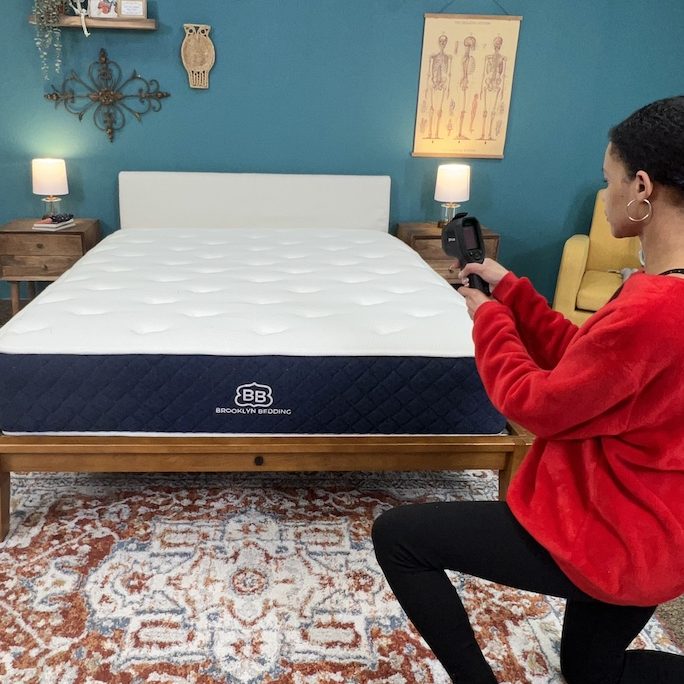
Learn more: How Body Thermoregulation Impacts Sleep.
Motion Isolation
A bed with good motion isolation can be particularly important for those with insomnia who share a bed with a partner or pet. A bedmate’s restlessness can wake their co-sleeper if the mattress doesn’t prevent motion from moving from one part of the bed to another.
We employ a seismograph app to evaluate disturbances caused by motion. Beds that register a lot of motion traveling from one side of the bed to the other have readings with big spikes. Those with small waves or flat lines mean that your restless partner shouldn’t disturb you much. Also, for a more real-life test, we have two of our testers lie side by side while tossing and turning to get a feel for how partners are affected on a given mattress.
Memory foam is known for absorbing motion and can make for an excellent mattress for couples. If you’d rather have a bed with coils, though, many hybrids that have memory foam comfort layers and pocketed coils to help with motion isolatoin.
Sex
Sexually active people may prefer beds that are responsive and provide plenty of bounce. These features help keep you from feeling stuck in the mattress and allow you to reposition more easily.
Good mattresses for sex need to be good for couples, and this means that in addition to responsiveness, they should also perform well in categories such as cooling, weight capacity, edge support, and noise. For those with insomnia, good scores in these categories may also be helpful in combating some of the symptoms that keep you awake.
Pressure Relief
Sleeping in a bed that prevents pressure from building up around the parts of the body that come in contact with the mattress may help you rest easier.
To provide you with an accurate assessment of how a mattress relieves pressure, Loren, Spencer, and I each get pressure map readings of us lying on our sides and our backs. How much pressure an area is receiving is indicated by different colors. If there is blue and green, there isn’t much pressure buildup. However, if the map lights up with red and yellow, it’s an indication that area is experiencing pressure.
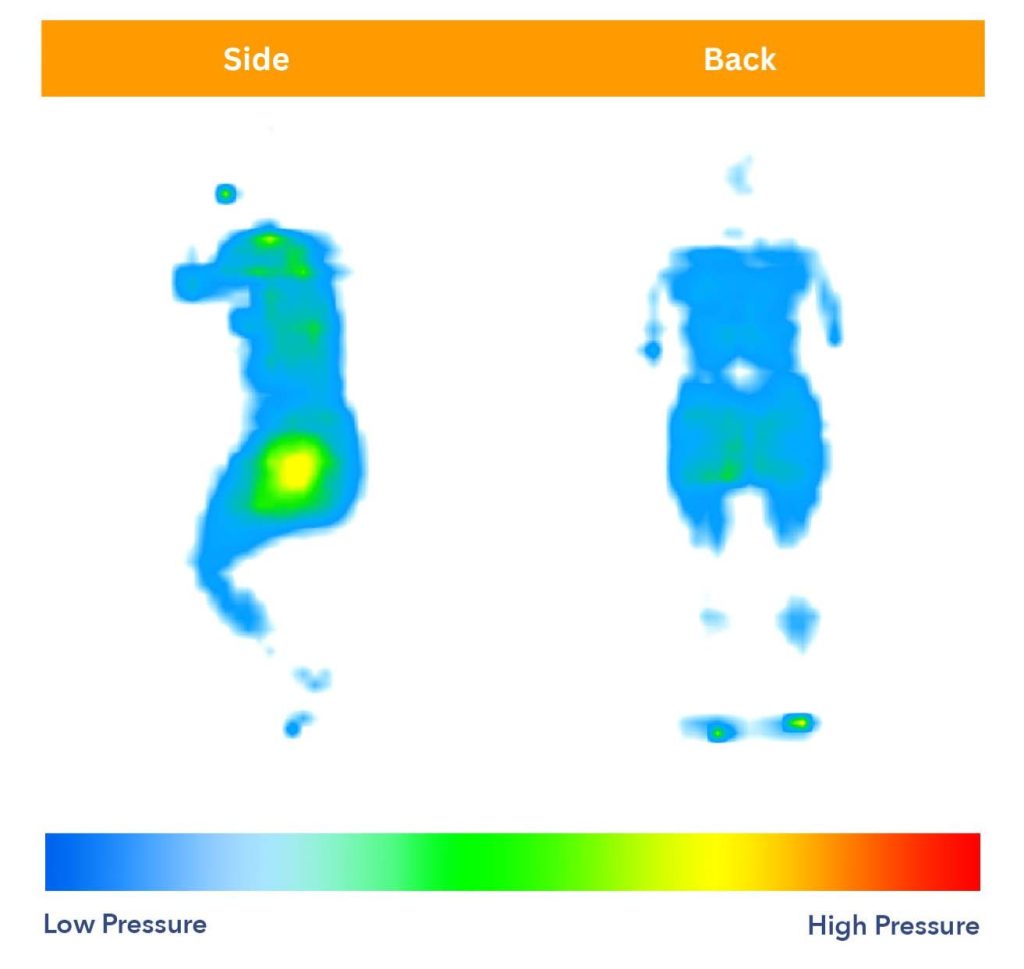
Edge Support
How well a mattress supports you around the perimeter is known as edge support. This may not seem like an essential feature, but reinforced edges allow you to utilize the entire surface without fear of falling out of bed. This is beneficial for couples as it gives them more room, and it also gives an added sense of security to those who gravitate towards the edge of the bed.
For those with insomnia, solid edge support can keep them from being startled awake by a side of the bed that feels as if it is giving way.
We report our edge support findings after sitting on the edge of the bed for a minute while tying our shoes. Loren, Spencer, and I also lie on the edge for another minute to see if we feel secure there.
If we don’t gauge much sinkage, we know that this bed has good edge support. Beds that perform well in this category often have stronger foam or coils around the perimeter.
What Causes Insomnia?
Insomnia is caused by a variety of factors2. Some of these include:
- Health conditions and medications – Allergies, acid reflux, back pain, arthritis, depression, and other health issues and their symptoms can cause you to stay awake when you’re trying to sleep. Furthermore, many of the medicines that help treat many of these disorders and others can also cause insomnia.
- Travel and swing shifts – Traveling to different time zones and working night or swing shifts can disrupt your circadian rhythm and cause you to have insomnia.
- Sleep disorders – Disorders like sleep apnea and restless legs syndrome can make it difficult to fall asleep and stay asleep once you do.
- Stress and anxiety – External factors such as financial problems, work issues, relationship conflicts, and the death of a loved one can cause insomnia.
- Poor sleep environment – Using smartphones or laptops, watching TV, or playing video games before bed can interfere with sleep cycles. Additionally, inadequate mattresses and sleep accessories can keep you up.
- Diet and alcohol – Eating too much late in the evening can cause physical discomfort that will make it harder to sleep.
Can the Wrong Mattress Disrupt Sleep?
The wrong mattress can prevent you from getting a full night’s sleep.
There are a couple of reasons why:
- Although some people can seemingly fall asleep anywhere, most people need a comfortable bed that supports a good night’s rest. Sleeping on a bed that doesn’t suit your needs or preferences may lead to insomnia if you’re uncomfortable and constantly tossing and turning.
- If you experience back, hip, or shoulder pain, it may be difficult to fall asleep or stay asleep. Beds that are geared towards addressing these problem areas and providing pressure relief, can go a long way in helping to ease your pain and get a restful night’s sleep.
Learn More: How to Cope With Pain and Sleep
How Can a Mattress Help with Insomnia?
A comfortable bed that meets your personal sleep needs can make it easier to fall asleep and stay asleep. If you sleep in a bed that relieves pressure and supports you, it could allow you to doze off sooner and reduce your chances of waking up throughout the night.
What Is the Best Sleeping Position for Insomnia?
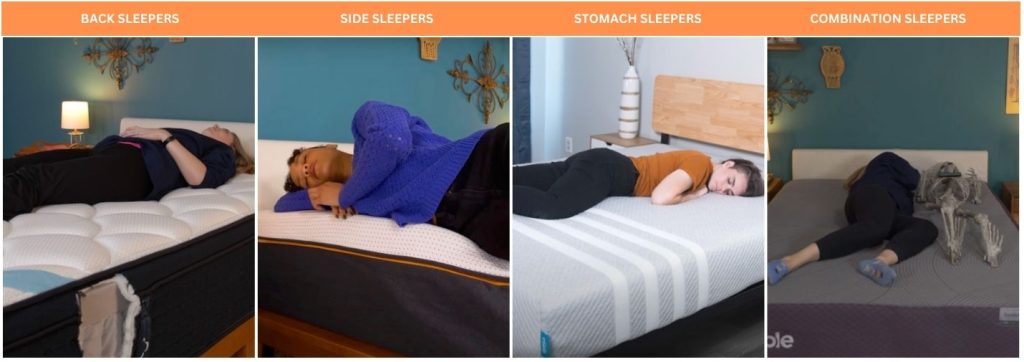
Back Sleeping
For those with insomnia caused by medical conditions such as asthma, some research suggests that sleeping on your back could help manage symptoms3. If your insomnia is related to lower back pain, back sleeping is recommended4.
Side Sleeping
For those who have gastroesophageal reflux disease (GERD), either in general or as a result of pregnancy, experts say sleeping on your left side is best.4 Side sleeping is also advised for those with sleep apnea to help keep the airways more open for easier breathing.4
Combination Sleeping
Combination sleepers with insomnia will likely want a responsive bed, such as one made from latex, coils, or both. This is so that they won’t feel stuck when they are changing positions, which might otherwise wake them up.
Stomach Sleeping
Sleep apnea is a sleep disorder in which someone repeatedly stops and starts breathing while asleep5. This can cause insomnia because when your breathing stops for enough time, your body will jolt you awake, gasping for air.5
As mentioned above, side sleeping is a way to reduce symptoms, but if you’re not a fan of this position, stomach sleeping is also recommended for sleep apnea.4
Tips for Better Sleeping with Insomnia
- Stick to a sleep schedule – Going to sleep and waking at the same time every day – including on weekends – can help keep your circadian rhythms consistent.
- Create a comfortable sleep environment – Investing in a comfortable mattress that suits your sleeping needs and keeping your bedroom dark and cool will likely lead to more restful nights.
- Avoid caffeine late in the day – Considering that caffeine is a stimulant, it is best to not consume it six hours before bedtime6 to avoid issues with falling asleep.
- Drink in moderation– Although alcohol is a depressant, research shows7 it may lead to insomnia symptoms. It is a good idea to always drink in moderation or avoid alcohol altogether if you’re living with insomnia.
- Don’t multitask – The bedroom should be for sleeping and sex. It is best to avoid activities such as working, eating, and watching TV in bed.
- Melatonin may help – Melatonin is a natural and often effective sleep aid that your doctor may recommend as an alternative to sleeping pills. Melatonin is a naturally occurring hormone that our body produces, signaling that it’s time for sleep, and taking the supplement may help8 you fall asleep at bedtime. However, melatonin is generally considered a short-term solution, so if your insomnia persists, consult with your doctor about additional options.
- Address medical conditions – Whether it’s chronic pain or another sleeping disorder that’s keeping you up at night, talk with your doctor about treatment options to help you rest easier.
Best Mattress for Insomnia FAQs
Which mattress is best for insomnia?
The best mattress for insomnia is a highly personalized decision. It should be a mattress that fits your individual needs and preferences.
Memory foam mattresses, for example, can counteract many of the issues that may cause insomnia as they typically offer soft contouring and pressure-relieving properties. They also tend to isolate motion well, which will help keep people from waking due to the movement of their sleepmate. For those who run hot or prefer more bounce from their mattress for easier repositioning, a bed made with latex or coils could help facilitate better sleep.
Can a mattress cure insomnia symptoms?
No, a mattress can’t always cure symptoms of insomnia. However, finding the right mattress for you may help prevent the need for naps and low energy levels since you’re more likely to get a good night’s rest. Having a bed that adequately supports your body type and preferred sleep positions can increase your chances of a restful night’s sleep.
Can insomnia cause psychosis?
It’s not known for sure that insomnia can cause psychosis since psychosis occurs from many different conditions. However, research has found that insomnia leads to psychosis-like symptoms. A study published in the Journal of Neuroscience9 found that healthy people who went just 24 hours without sleep exhibited symptoms that mimicked schizophrenia.
Find Out More: Sleep Deprivation And Psychosis
What’s the difference between insomnia and parasomnia?
Although the words sound similar and they’re both sleep disorders, these are two radically different conditions. Insomnia is having habitual sleeplessness or the inability to sleep.
Insomnia is when you have habitual sleeplessness or the inability to sleep. Parasomnia, on the other hand, is unusual behavior that you do while you’re asleep. The most well-known form of parasomnia is sleepwalking. Others include night terrors, teeth grinding, and sleep-related eating disorders, among others.
Want to learn more? Check out our complete guide to insomnia.
Can melatonin help with insomnia?
Melatonin supplements may help with insomnia, but research is ongoing. Further, you should always consult your doctor before adding any supplements to your daily routine.
You can also boost your body’s natural production10 of this hormone by consuming eggs, milk, wheat, cherries, nuts, seeds, tomatoes, and peppers.
Another thing to keep in mind is that light, even artificial light, interferes with your body’s ability to produce this hormone. Therefore, we recommend keeping the lights and television off in the bedroom at night, and if you get up at two in the morning to use the restroom, turn on a small toilet light or nightlight.
Check Out Our Guide: Best Melatonin Supplements
Is sleep apnea is related to insomnia?
People with sleep apnea can wake up multiple times at night when their airway becomes blocked and they struggle to breathe, simultaneously leading to insomnia. The good news is that treatment options are available to those with sleep apnea, including CPAP therapy, which could help those with insomnia due to sleep apnea.
Learn More: Sleep Apnea Facts and Best Mattress for Sleep Apnea
| Mattress | Best For | Price (Queen Size) | Review |
| Helix Midnight | Editor’s Pick | $1,199 | Helix Midnight Mattress Review |
| DreamCloud Premier | Side Sleepers | $1,832 | DreamCloud Premier Mattress Review |
| Nectar | Cheap | $999 | Nectar Mattress Review |
| WinkBeds Plus | Heavy People | $1,999 | Winkbed Plus Mattress Review |
| Nolah Evolution | Couples | $2,299 | Nolah Evolution Mattress Review |
| Bear Star Hybrid | Back Sleepers | $1,998 | Bear Star Hybrid Mattress Review |
| Brooklyn Bedding Signature Hybrid | Hybrid | $1,249 | Brooklyn Bedding Signature Hybrid Mattress Review |
| Titan Plus | Firm | $1,249 | Titan Plus Mattress Review |

Julia Forbes
Sleep Advisor Mattress Tester
About Author
Julia is a product tester at Sleep Advisor, specializing in testing out mattresses and sleep accessories – she’s in the right line of work, because she loves to sleep.
Stomach Sleeper
Education & Credentials
- Certified Sleep Science Coach
References:
1. Xu, Xiaoying., et al. “Association of Melatonin Production with Seasonal Changes, Low Temperature, and Immuno-Responses in Hamsters”. Molecules. 2018.
2. “Insomnia.” Mayo Clinic. Last modified October 15, 2016.
3. Beno Kalolella, Admirabilis. “Sleeping position and reported night-time asthma symptoms and medication”. The Pan-African Medical Journal. 2016.
4. “Choosing the Best Sleep Position”. Johns Hopkins Medicine. Webpage accessed October 31, 2023.
5. “Sleep apnea”. Mayo Clinic. Last modified April 6, 2023.
6. Drake PhD, Christopher., et al. “Caffeine Effects on Sleep Taken 0, 3, or 6 Hours before Going to Bed”. Journal of Clinical Sleep Medicine. 2013.
7. Chakravorty, Subhajit., Chaudhary, Ninad S., Brower, Kirk J. “Alcohol Dependence and its Relationship with Insomnia and Other Sleep Disorders”. National Library of Medicine. 2016.
8. “Melatonin for Sleep: Does It Work?”. Johns Hopkins Medicine. Webpage accessed May 13, 2024.
9. Petrovsky, Nadine., et al. “Sleep Deprivation Disrupts Prepulse Inhibition and Induces Psychosis-Like Symptoms in Healthy Humans”. The Journal of Neuroscience. 2014.
10. Meng Xiao., et. al. “Dietary Sources and Bioactivities of Melatonin”. Nutrients. 2017.

